#but by nature it asks so many complicated ethical questions
Text
anyway, somewhat related to my last post-- why is it that every time I see something about an AI related project, my first thought is “do they have an ethics board?”
#artificial intelligence#machine learning#like i love the technology i think it could be so cool#but by nature it asks so many complicated ethical questions#and every single time it feels like the people responsible for a given project did not give a single fuck about ethics#see: the discourse around ai art#for just one example
7 notes
·
View notes
Text
The Soul Still Burns: Analysis of the Lords of Cinder (DS3)
What follows is a short essay on the Lords of Cinder from Dark Souls 3, exploring their symbolism on spiritual and metatextual levels. After that is a related reading of Slave Knight Gael, the final adversary of the Dark Souls trilogy.
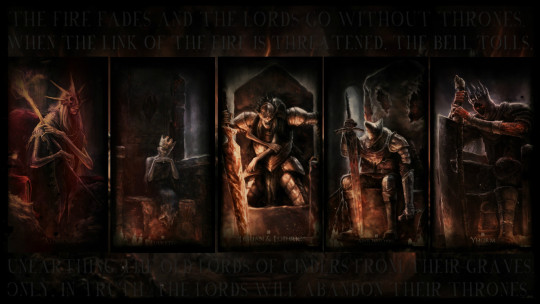
The Lords of Cinder are in many ways the primary adversaries of Dark Souls 3. This title they share, “Lord of Cinder,” refers to a personage who has rekindled the first flame, keeping the cycle of light and dark going.
Cinder is a substance which continues to burn without the presence of fire but does not reduce to ash. So euphemistically, it seems that the Lords are somehow stuck in their process of purification, and the game suggests that the world is stuck along with them; this is why it is the Ashen One’s task to “set them upon their thrones”—to hurry them along and thus allow the world to follow its natural decline. As individual characters, each of these Lords represents a different attitude that complicates and prolongs the cycle.
Through these stubborn Lords the game is commenting on at least two things. On the metaphysical level, it reflects the Buddhist idea that certain attitudes keep people reincarnating over and over again, unable to extricate themselves from the material world of suffering (samsara). While on the metatextual level, the game is suggesting that certain attitudes keep players coming back to Dark Souls again and again, starting new games, making new builds and revisiting old files.
The idea there on the metaphysical side finds an easy analogy in Buddhist doctrine: the “three poisons,” the three root causes of suffering. These are hatred, greed, and delusion. What’s interesting is that these essential vices also fit pretty easily onto the different types of players that are being caricatured by the Lords. We’ll break these correspondences down in a second.
But First: Why Do They Correspond?
So we have these sets of three. Three lords, three poisons in Buddhism, three types of Souls players. How convenient. When we analyze art, we sometimes ask, “Huh, is this structure really there, or am I projecting it into the material?” And if the structure is really there, baked into the work, that doesn’t mean that it’s due to developer intention. Archetypal forms sometimes show up in work via an unconscious influence, be it due to the cultural milieu, personal psychology, or some a priori biological disposition of the human being.
And the thing about Dark Souls is that it’s an unusually honest piece of art, in that its creative team allows their own free associations and intuitions to show up in the work without too much self-censorship or questioning. They make space for a mystery to show up on its own terms, and in leaving its riddles unanswered, there is more space for discovery by the people who play it.
It should also be said that cultural ideas persist for a reason. Beneath the ethics and ideology of the people who originally named the Buddhist “three poisons,” there may be something timeless, something perennially descriptive of human nature. If that is the case, then it would make sense for this same triplicity to unfurl itself in other cultural products. So for one reason or another, these three poisons, these addictions, show up diegetically in the characters and are also expressed in player psychology.
I say all this just because sometimes I feel very aware of the disconnect between much of Souls lore discourse and the broader field of mythological study. Since we are gamers first, there may be this tendency to want to “solve” the lore, but that’s not what we’re doing here. Myth functions because it elaborates our experience of the world through affective resonance; it attaches images and characters and stories which help us anchor our own prelinguistic impressions of the world, cultivating our sensitivity there.
Anyway, let’s look at these Lords.
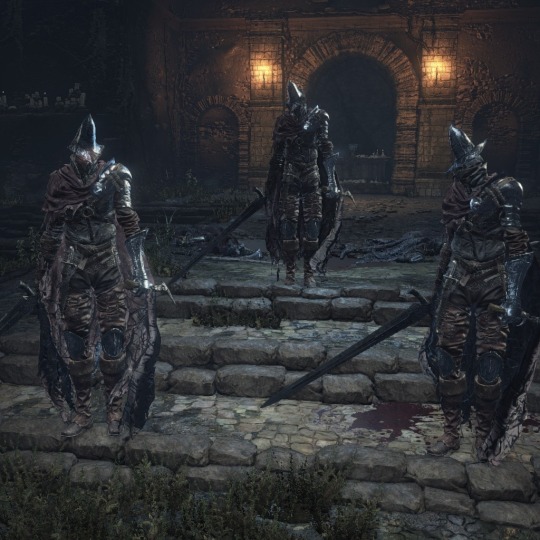
Abyss Watchers
Poison: Hatred
The lore of the Abyss Watchers is pretty clear: they have an obsessive fixation on the abyss, and are ready to raze an entire town if they suspect abyssal encroachment. This obsession has literally possessed them, as they are now “abyss touched.” Gaze too much into the abyss, etc. They carry such strong contempt for the disavowed object that they don’t care what comes between it and their sword. This is clearly demonstrated by the fact that they are a brotherhood yet are unhesitatingly slaughtering themselves again and again. Hatred has made them blind, and has also caused them to resign their individuality (they are identical, mere instruments of a transpersonal grudge). They cannot die, their hatred keeps them locked in combat.
Type of Player: competitive | Interest: combat
The Abyss Watchers are a representation of PvP addicts. They have no powers other than tenacity; they perform the same combos repeatedly. When you are really gripped by a PvP binge in Souls, you often end up doing the same thing again and again. The fight takes place in a mausoleum, on top of many chambers filled with human remains. The fact that this boss fight is instructional about combat, specifically about looking for tells (a cloud of dust always signifies the end of their combos) might be another clue. There is no limit to how good you get at Souls PvP; every foe is an opportunity to improve timing and strategy. You can just keep stacking anonymous bodies under yourself.
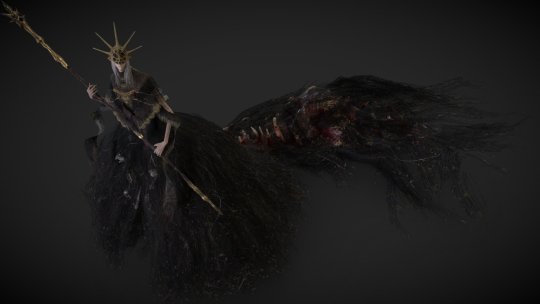
Aldrich
Poison: Greed
Aldrich invokes the concept of supremacy many times: he is in the supreme area from Dark Souls 1; in the supreme boss room of that area; he wears as a crown the former supreme lord of that area. This is because he devours lords; he tries to take prestige upon himself through acquisition and incorporation—greed.
Type of Player: completionist | Interest: content
Aldrich is a commentary on completionist players. He is someone who “plays the game to death”, acquiring every object, reaching every achievement, devouring the soul of the game through taking everything into himself. He becomes bloated by consuming as much of the game’s content as possible. The old God whose likeness he has adopted is Gwyndolin, who was, in narrative terms, the one pulling the strings in the land of the Gods. And in gameplay terms, he is a secret boss. So on both counts we have someone who is elusive, and exists more or less at the boundary of the gameworld. When a player tries to see every last little morsel of a game, they become somewhat like Gwyndolin, a manipulator of a virtual world. If you know too much about a game, you have the risk of being less immmersed.
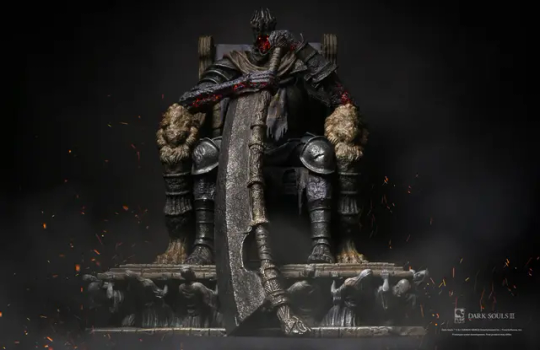
Yhorm
Posion: Delusion
In Buddhism, the poison of delusion secretly underlies the other two poisons, as the impulse toward hatred and greed are ultimately born of some false view about reality. This is akin to how the profaned capital sits below the rest of the kingdoms. To beat Yhorm you essentially have to “play pretend” with him, picking up a fake super-weapon, or fighting alongside Siegward, a knight who appears to be somewhat deluded about the state of the world, enthralled in the same fantasy as Yhorm himself.
Type of Player: lore researcher | Interest: meaning
The profaned capital is full of statues—fixed images of myth; and empty goblets—treasures with no utility. Not to mention the area with the swamp which is full of symbolic imagery, but serves no narrative or mechanical purpose. The entire profaned capital challenges us to make sense of it; it is the ultimate temptation of lorekeepers in DS3. It throws at us a disproportionate amount of reference to DS2, which is famous among Souls players as the least thematically sensible Souls game. The Greatshield of Glory is found right outside Yhorm’s room, in a conspicuous room full of treasure, and yet it is a very impractical shield and offers very little lore value. If a lore-minded player picks it up, it directs them to a legendary personage from the War of Giants, which raises far more questions than it answers. The same is true of much of this area—the Eleanora, the Monstrosities, the Profaned Flame itself—they are all there to get you to speculate. These are the players who come to Souls games again and again, trying to find the “ultimate meaning.” They seek the grail, claim to find it, and then chuck in a pile with the others.
Yhorm's story also imitates the primordial Artorias myth: forsaking his shield in preservation of something more valuable. Other than that Yhorm is largely a cipher when it comes to biography, with a void for a face, which itself epitomizes what must remain at the center of mythology and storytelling: mystery.
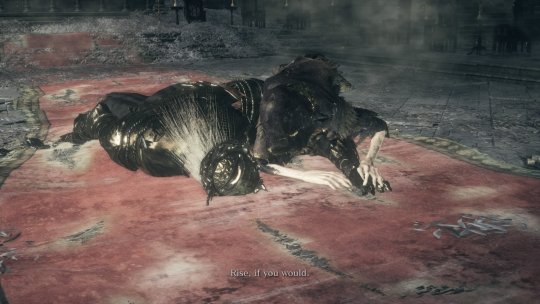
Sit Down and Seek Guidance
So we have the three reasons that people become fixated on Souls: the combat, the achievements, and the mystery. But there is a fourth lord of cinder boss, who is conceptually apart from these three: the Lothric Twins. They represent yet another kind of person who must keep playing Dark Souls: the developers. Lothric is striving to produce “a worthy heir,” a proper sequel to Dark Souls 1. The Princes are bound to their chamber as the developers are bound to their project, as that is their curse—“but you may rest here too, if you like.” In this context we can see their duality as the dual nature of having to work on the game and also play it to death. The privilege and the loftiness of the promise of a great piece of art (Lothric), and also having to go back "into the trenches" of the work itself (Lorian). Notably, neither of them can walk, they just teleport around. They are stuck at work, trying to bring the new world into being. Also I can’t go this whole essay without mentioning the obvious: that the Ashen One is bringing Lords to their thrones, and we players and developers have to assume our little chairs and couches when we access this world.
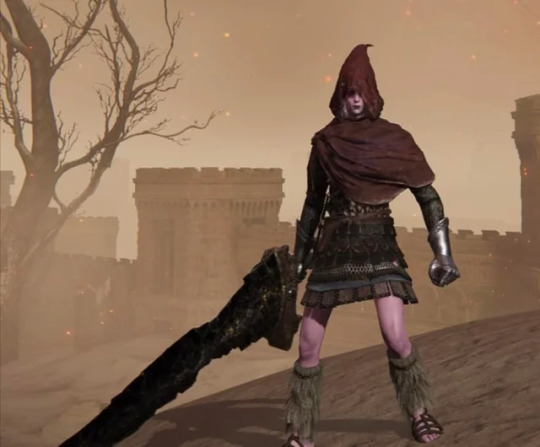
Playing Beyond the Point of Pleasure
Of course the most extreme example of someone stubbornly remaining in the world no matter what is Slave Knight Gael. He is looking for pigment, which seems to be a euphemism for the substance of humanity (the Dark Soul). He wants to give it to the painter, the world-creator, so that a new world can be made. He is willing to indulge in a wasteland of abject violence for as long as it takes in order to renew something. Ironic that he is probably only prolonging the current world in his obsessive drive to recycle it faster.
Let’s examine the relationship between the figure of the painter and her relationship to Gael. That she is a spiritual entity is obvious: we never see her touch the ground, she is always in an upper room and lifted on a piece of furniture. Among other things, she is a clear metaphor for life springing eternally. A creative child who continues to paint despite kidnapping and imprisonment. She is the heart of the painted world, itself a place that symbolizes the idea of the representation of reality.
I want to make sure this is clear, because it is a bit of a kaleidoscope to consider. Any subject in Dark Souls stands for many things, but something that the painted world specifically represents is the very concept of representation. So of course the places in our imaginations are painted worlds, but so is this physical world of appearance, the maya of mundane reality. Not to mention that a work of art is a painted world, and the game we’re discussing is a painted world. When a work of art is able to recreate itself in itself, we can see this funny effect of mirrors reflecting mirrors infinitely. This results in seemingly inexhaustible symbolic content—there is so much potential to find meaning and create connections. Because Moby Dick represents a work of literature; the Tempest represents a play; Twin Peaks represents a TV show, these works can offer extensive insights not only into their medium but into the nature of reality. In these and other examples, the representation of the medium within the work may or may not be a single subject, but since Dark Souls is formally a game about levels and level design, the painted world is the heart of its self-reflexivity. The painted world can be pointed to as the summary of this fractal device. And the personification of that device, its ambassador to the player, is the painter.
The miracle or divine child is also an archetype familiar to us from Lothric, in their struggle to produce the “worthy heir.” Reality seeks salvation through the appearance of grace. They want it in a clear, incontestable form—to be able to point at it and say, "thank goodness we went through all that, because look, now here is the meaning, here is that which validates all that came before." In the world of Dark Souls 3 the religion of the masses is the Lothric stuff; meanwhile knowledge of the painted world is much more obscure. Lothric’s religion is obviously regulated and hierarchical, while Gael’s devotion to the painter is highly personal and private: he carries around a scrap of painting; he prostrates to a hidden idol in a small chapel; he considers the painter his family. He is emotionally close to the object of his worship.
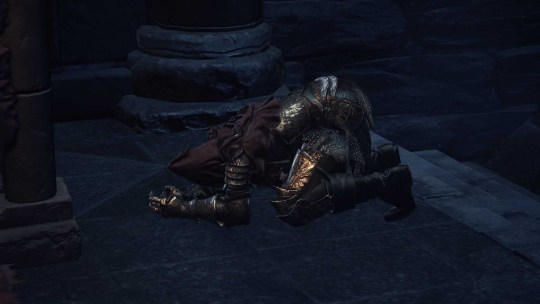
But whether it’s Lothric or Ariandel, they are anticipating the divine child to redeem the world. As an archetype, the child ultimately represents surprise. The possibility of being delighted by life in its creative novelty. The child as an archetype appears in our own behavior when we do something without any sort of contrivance or mental interference, doing something in the world which doesn’t seem to have come from who we conceive ourselves to be. This is miraculous. Such an action enchants the world, and there is no explaining it, even if it may weave all kinds of stories around itself, retroactively framing things that have led up to it as portents or promises. (Though not exclusive to him, this trait is well-known in characterizations of Christ, and DS3 is clearly indebted to Christian iconography, so do with that what you will). Regardless of the specific cultural invocation, the divine child is a personification of something that happens within the human spirit. TFW you are renewed by a fresh and spontaneous engagement with life.
The grace of the miraculous often comes to us through play. Play is more of an attitude than an activity; the feeling of play may come to us through making a painting, or chatting with a friend, or moving around in a video game. We can play video games idly, competitively, experimentally, creatively, studiously, whatever, the feeling of “play” can show up regardless. We can sit there playing a certain game from a certain motivation, and feel totally rote and joyless, and question, “Why am I doing this?” Or we might sit there and play the same game with the same motivation, feeling totally lit up by it, its purpose to us obvious and self-validating. We are not even questioning why we are doing it, we are enjoying life.
This is really the ground that the miraculous tends to land on. Grace, meaning, and an immanent love of life are more likely to show up when we are in flow and not exercising our capacity for self-assessment. But like everything in life, we mistake the images and objects around us for the feeling of grace. Any given object might only be the catalyst once; it’s not about the object. This is extremely easy to see in cases of acute nostalgia; adults chase enchantment through collecting Zelda memorabilia or going to Disneyland, in pursuit of what kindled their spirit as a child. It was never really the game or the character that was doing it, it was what they were able to access within themselves.
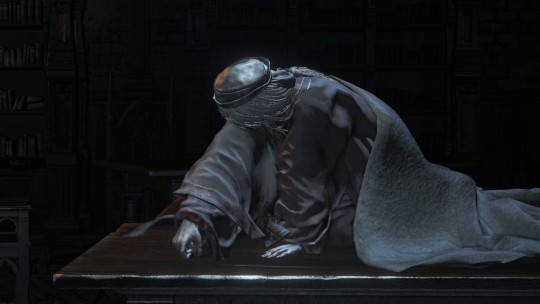
So anyway Gael has yet to realize this. He thinks the Dark Soul is out there in something else. That it will be yielded as a drop if he just kills the right enemy, or 10,000 enemies, or goes to the right place at the right time. You can see that this is something of a synthesis of all the other Buddhist defilements: there are elements of completionism/greed, violence/hatred, mysticism/delusion. There is even the suggestion of the developer of these games again, in that Gael is a “slave,” forced into participation in the world to assist some creative apotheosis. (Isn’t it funny that his weapon is a worn-down executioner’s sword?—whether the person coding or the person playing, we are all “executing” command after command). The thing that really keeps him on the wheel is something beyond any of the player types and their vices; it is almost some sort of pure, amoral automatism, a churning drive that on one side resembles wanton nihilism, and on another side single-minded piousness. Is one disguised as the other, or has Gael somehow stepped beyond this binary? Yet another dichotomy in Dark Souls that begs to be reconciled, but whose tension creates the opportunity to participate creatively in its expansive mythology. When things are held apart we can move between them.
To really understand Gael, we have to contend with the question of a person’s relationship to their own soul, since that relationship is so plainly suggested by Gael and the painter. (This question, by the way, is much elaborated in Elden Ring, with its repeated foregrounding of the image of the maiden or “consort”). If we were to see Gael and the painter as partitions within one person--whether she is his soul, or his inner life, or his better nature, whatever—then in any case Gael is the side which goes out into the world and experiences it. He is the creative extension into the world as its active participant and realizer. Yet he is clothed as the warrior, the executioner. While the one who is dressed as the artist, the painter, just stays in her room and imagines the world—but this is where the magic of creation is really felt. We involve ourselves in life, or in a game, but we are only really changed and renewed when that exterior experience is “brought home” into the inner life. We do something “in the game,” but the act of “painting,” in renewing the world through our creative interpretation, is a decidedly interior experience.
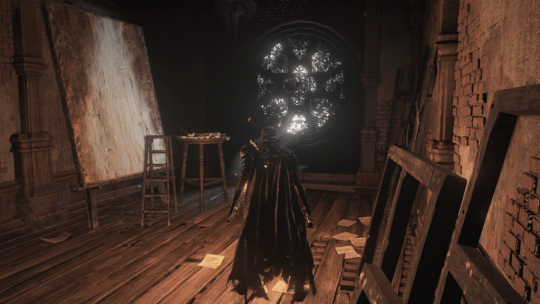
#dark souls#dark souls 3#lords of cinder#game entrainment#dark souls analysis#dark souls lore#ariandel#slave knight gael#the painted world
79 notes
·
View notes
Note
3 questions:
1. How do you carry the heavy burden of having so many correct beliefs plus the rare combination of motivation and the right approach to making the world a better place? 2. Does your back hurt?
3. What do you think about David Pearce's utopian idea that a sufficiently technologically advanced future society could and should one day abolish (or at least minimize) suffering, partly by redesigning the biosphere and its inhabitants to be kinder and gentler to each other? IMO that could involve bioengineering predation out of existence.
Sorry if I already asked you about this. You seem very smart and seem to know a lot about ecology so I want to know your thoughts
1. Half the work is fighting very hard against starting to believe this very thing (that I have correcter beliefs than many other people). I hope my posts inspire y'all to read things that are not posts.
2. Not really.
3. The term you're looking for is "life on Earth goes extinct."
But, okay, I've seen this sentiment before, and it is—not that you are, just that the idea is— a naive and arrogant approach to ethics in nature
I don't think it's wrong to change the biosphere. That's what life DOES. It evolves.
But "ending suffering" is an impossible goal because we don't, and in some ways can't, understand suffering scientifically. Suffering is an internal state that is defined only by the perceiver's experience of it. We still do not know the ins and outs of how physical pain works in humans, let alone spicy, obscure emotions like Existential Angst.
People who are concerned with the problem of suffering in nature focus on predation and pain in the animal kingdom—understandable if you have thought about it for under five minutes, but hopelessly incomplete and arbitrary if you consider that a creature's ability to feel and perceive is not determined by how humanlike it is.
There is no reason to think a plant or a mushroom is less capable of "suffering" than a lobster is. Plants and fungi are different; they are not simpler or less advanced or less alive than animals.
The corollary to this is that being marginally more humanlike doesn't mean that a creature "suffers" in the way a human does. When you think about it, living things can perceive "negative" stimuli because the ability to do so helped their ancestors survive. A solitary creature, for instance, wouldn't experience loneliness because being with others of its species isn't really necessary or beneficial for it. It's very likely that a creature that can't change its behavior to accommodate for or help heal an injury, can't experience continuous pain like we can. Does that mean they don't "suffer" as severely as we do? I'm not sure. It's impossible to say. I'm sure we all experience the world profoundly—I'm sure the perception of light by a bryozoan colony and the subsequent growth toward the light and feasting on algae "feels" as potent and spiritual as any of my complicated chordate emotions.
Long story short, stimuli like pain were adapted as responses that help a creature survive by avoiding things that are injurious to its survival. To eliminate suffering, you'd have to invent creatures that don't want to be alive, which would die out and be replaced by creatures that do.
Inventing creatures that don't want to be alive somehow sounds way more fucked up than anything that already exists.
But, hi, we are social creatures. Our survival instincts are overwhelmingly oriented toward seeking safety with other humans. PTSD is a disorder of social misplacement; it develops when the communities we live in don't properly acknowledge and care for our hurt after a distressing experience. We evolved to be able to communicate pain and distress to other humans, which means being aware of our own suffering, and that others can suffer, which explains why we are having this conversation, because wanting to relieve other creatures' suffering is a quality of our species.
I get tags on my posts sometimes referencing how nature is a brutal suffering machine—often when I'm talking about plant cognition and awareness—and it's troubling because that's not the takeaway I want people to have at all.
Because first of all, a healthy ecosystem working "as intended" does a lot to minimize suffering. People see predation as this violent and brutal thing, but for a deer, death by festering injury or starvation or parasite overload related to overcrowding or even old age is a lot more nasty and painful.
A biosphere without predators is unavoidably worse. The buffer on prey populations that predators provide creates optimal conditions for prey, because otherwise, the animals just reproduce to the point where the population can't increase any more because the animals are too sick/starving.
Predation ensures a deer with a horribly mangled broken leg will get picked off instead of limping around for months in pain (something i actually witnessed!). It's not evil. It just is.
If you really wanted to eliminate suffering, you would have to eliminate being alive, and to be completely honest, that is probably not possible. We could not render the Earth completely empty of even single celled organisms if we dumped every toxic chemical into the atmosphere and bombed ourselves with every nuclear weapon. We would still have tough bastards like Deinococcus radiodurans around, and those guys would probably eventually evolve into organisms with the capability to experience pain all over again.
Abiogenesis may be a bitch but life, once it exists, is a Pandora's box that can't be unopened. The first thing to be alive also invented death, and there's no way around that. The monkey-typewriter-room of molecules that let you understand that you exist are going to write out "WOW, THIS FUCKING SUCKS" every once in a while.
When you think about it, the ecosystem as it naturally evolved probably is one of the most low-suffering possible ecosystems, assuming that things that can be considered "suffering" evolved as survival mechanisms, and unnecessary mechanisms for suffering would be eliminated over time due to the detriment they are to survival.
Living things develop survival mechanisms, and this means the ability to distinguish good and bad stimuli. Can't get around that.
Even with the existence of predation and parasitism as important modes of survival, such overtly ""antagonistic"" relationships in nature aren't even dominant. A staggering portion of the biosphere is engaged by necessity in mutualism—most plants form mycorrhizal symbioses and flowering plants are also symbiotically joined to pollinators, not to mention that plants need each other to thrive.
You can view this positively (plants have friends!) or negatively (plants can get lonely...)
482 notes
·
View notes
Note
I know you specialise a lot in Barca Femeni but I wanted to ask your opinion on this (because I’ve seen you previously speak about the Mangriñan sisters and how they post their children online etc.)
What are your thoughts on Katrina Gorry (Matilda’s and West Ham Player) and her Partner making a whole new instagram for their 2 children, Harper who is 3(?) and their newborn?
The instragm account has 30k + followers, Do you think that it’s normal? Does it make the whole situation different because they’re in the public eye? There are so many different opinions floating around online but I’ve been following your blog for a while and wanted to know your thoughts on this!
Love your blog btw Xx
thanks anon for the kind words! 🫶 uff, this is a complicated question! 😅
so let me preface this to say that i don't really know much about katrina gorry or her partner and their situation, so i'm going to keep my comments general and not specific to them. (also fyi, i have many more issues with the mangriñans than just this! 😅)
let's talk about the ethics of 'mommy bloggers':
first, there's a difference in showing your kids on social media from time to time and documenting their milestones vs. creating a dedicated public social media account to showcase your kids. the former i don't take issue with, but it's the latter that's controversial and can be exploitative.
what gives me the ick is when bloggers advertise using their kids, have sponsored posts featuring their kids, or generate income from an account featuring their kids because that introduces a commercial and financial aspect to it that's akin to work. and kids cannot consent to doing this type of work.
next there's the exploitative nature of this type of work and studies show the mental health effect on kids of always having to perform and be 'on' as to not disappoint their parents. it's the same type of analysis that comes up when you read memoirs or watch docs about former child stars. the ruby franke child abuse case comes to mind as an extreme example of this!
finally, we talk a lot on my blog about privacy and a player's right to privacy but what about a child's right to privacy? it's a complicated issue to tackle. by showing our children so often, do we take that right away from them because they are not consenting to showing themselves? or is there a type of balance that needs to be taken? i don't have an easy answer but it makes me appreciate the steps that irene paredes and her wife, lucía ybarra, go to by not showing mateo's face and limiting his access to the public. it seems a good balance!


anyway, those are my general thoughts. hope that makes sense!
21 notes
·
View notes
Note
maybe weird and mybe vague, but if you ever have the time and inclination, would you talk bout your opinion on Geralt and *religion*? I haven't read the books in a very long time, and i only am halfway though the series, but sometimes geralt says something (' for it is the **holy** and irrefutable right of every woman.') and i'm left thinking, because he doesn't seem to believe in much but at the same time he does?
Religion and Spirituality in The Witcher Books: What DOES Geralt of Rivia Believe In?
Hello my dear! Sometime you guys will send me an ask that just makes me go...HOW DID YOU KNOW I LOVE THINKING ABOUT THIS AND WOULD BE DELIGHTED TO RAMBLE ON ABOUT IT.
VERY MILD BOOK SPOILERS AHEAD
VERY LONG, EXTRA, GEEKY POST AHEAD
So. For those who missed it, this is in reference to my "abortion in the witcher books" post, where Geralt calls abortion a "holy and irrefutable" right, both words that imply either spirituality or at least moral beliefs that surpass reasoning and rationality.
Yet, we know that Geralt does not believe in the existence of 'the gods', (I'll pull the quotes for that and show evidence as we go) so why would he use such language? What DOES he believe in? Does he have a guiding spiritual system of beliefs?
A lot of people interpret Geralt's attempts at political neutrality as wishy washy or cynical or apathetic, and believe, as a result, that he does not have a particular driving moral system of beliefs. In fact!! On my abortion post there was a guy on twitter actually trying to fight with me, saying that it doesn't matter what Geralt thinks about abortion, because Geralt doesn't value human life. (lmaoooooooooooooooo)
I am here to say that this is incorrect all around. (to the conservative dudebro I told him that he was conflating 'has killed' with 'does not value life', two very different things.) Anywho. Geralt actually has an incredibly strong system of morals and ethics that are VERY clearly laid out in the books. We can even name that system of beliefs. It just gets complicated!
So, let's talk about that. First, let's lay out his beliefs.
Disclaimer: I'm working with English translations of the books, and as I get very precise about words, just please be aware of that limitation. Many times I wish I had a Polish friend who had copies of the book and wouldn't mind me (the dreaded Geraskier shipper and twn fan) pestering them every time I had a question about wording. If anyone doesn't mind being that friend for me, please let me know.
Now. Onward.
For those who did not read my abortion post, Panur is referring to the fact that In Sword of Destiny (p 345), when Geralt is discussing his mother with Calanthe, this is what he calls abortion:
“A choice. A choice which should be respected, for it is the holy and irrefutable right of every woman.”
There are two words that Geralt uses here, "holy" and 'irrefutable" and both imply something 'higher' than reason. Holy is religious in nature, while irrefutable is along the lines of "inalienable" which is the word Dandelion uses, when speaking about the right to abortion. In Baptism of Fire (p317), Dandelion refers to abortion like this:
It’s obvious that only the woman can make a decision like that. It’s her inalienable right.
Inalienable and irrefutable are words that describe inherent rights, which are not subject to rational debate.
Many would describe that as sacred or untouchable. So even though it is not as directly religious as the word 'holy', it implies a value that is higher than logic or rationality.
AND YET, we do know that Geralt does not believe in the gods. It is a point of discussion between him and Nenneke on multiple occasions. In The Last Wish (p37) Nenneke is worried about Geralt and is trying to convince him to let Iola, one of her priestesses, put him in a trance. He resists her idea. Here is what Nenneke says.
"Iola isn't a medium or a mentally ill soothsayer. That child enjoys the goddess's favor."
Geralt's face does something in reaction to this that indicates his disbelief, and Nenneke responds.
"Don't pull silly faces, if you please."
So whatever his face did, it wasn't good. She continues.
"As I said, your view on religion is known to me, it's never particularly bothered me, and no doubt, it won't bother me in the future. I'm not a fanatic. You've a right to believe that we're governed by Nature and the Force hidden within her. You can think that the gods, including my Melitele, are merely a personification of this power invented for simpletons so they understand it better, accept its existence. According to you, that power is blind."
So, Nenneke describes his belief system in regard to the gods as...they don't exist, at least not in the way people view them. There is magic and chaos and monstrous beings, sure. But there are no 'all powerful' gods enacting their will on the world, there is nothing so predictable or organized.
Those beliefs are repeated elsewhere in the books, but I won't pull every single quote. This one does the trick. Geralt believes that people invented the gods to explain the world around them.
We also know that he believes humans invent monsters in order to seem less monstrous themselves. He says this to Dandelion in The Last Wish (p167).
"People," Geralt turned his head, "like to invent monsters and monstrosities. Then they seem less monstrous themselves. When they get blind-drunk, cheat, steal, beat their wives, staar an old woman, when they kill a trapped fox with an axe or riddle the last existing unicorn with arrows, they like to think that the Bane entering cottages at daybreak is more monstrous than they are. They feel better then. They find it easier to live.
So. In Geralt's world view, human beings are the creators. They create gods. They create monsters. And when they blame the gods or monsters, it is a false powerlessness engineered to escape accountability. But Geralt holds people accountable anyway.
So, if Geralt does not believe in the gods, does that mean he believes in nothing? Does that mean he does not have a moral code?
Actually, it is the opposite.
If people are held accountable for their actions, when they have no gods or demons or monsters to blame, the standard for morality is much higher.
Geralt if often called self righteous for this stance. In The Last Wish, (p160) when Geralt is complaining about how hard it is to make a living as a witcher, Dandelion even tells him he should be a priest, saying the fact that he doesn't believe in gods shouldn't be any barrier.
"Whatever. Become a priest. You wouldn't be bad at it with all your scruples, your morality, your knowledge of people and everything. The fact that you don't believe in any gods shouldn't be a problem. I don't know many priests who do. Becomes a priest and stop feeling sorry for yourself."
But without spirituality, where does Geralt get his system of morals? How does Geralt decide what is right and what is wrong?
Well, once again, Geralt puts human beings (instead of gods) at the center, in the position of power and importance.
Let's start with the moral quandary Geralt faces most often. Which monsters are ethical to kill, and which are not ethical to kill?
Geralt has arguments many times throughout the books with people who want him to kill a monster that he does not want to kill,
AND conversely
he has arguments with people who judge him for killing monsters that they believe should be protected.
Those people are on the extremes. Some people see all monsters as inherently without worth. At best, they think they are subhuman and can be murdered for money making schemes or potions, or at worst, they think they should all be exterminated.
The other kind of person (mostly druids and academics) see them as part of mother nature, sacrosanct and untouchable, and accuse Geralt of being immoral for killing even one.
But for Geralt? It isn't so simple. There is no 'one size fits all'. He doesn't 'other' monsters like that. So he has to decided each and every time. And as a nonbeliever, Geralt does not have a holy book or god to consult with to tell him what is right. And yet? He always has an answer.
In reference to the monsters he does not want to kill, here are a few passages of Geralt explaining his reasoning. In The Last Wish, he tells Dandelion he won't kill mecopterans because:
I'm not going to kill mecopterans. Nor any other harmless creatures."
Then, in Sword of Destiny (p42) when when Yennefer and Dorregaray are arguing about dragons, Geralt speaks up. What he says explains why he doesn't kill them:
"Dragons aren't man's enemies," Geralt broke in.
Then later, Yennefer challenges him.
"...And what do you know, witcher?"
“Only," Geralt said, ignoring the sudden warning vibration of the medallion around his neck, "that if dragons didn’t have treasure hoards, not a soul would be interested in them; and certainly not sorcerers...
Later on in the book, Dandelion says that Geralt doesn't kill night spirits because they are "sweet". There are a lot of other examples, but basically, that is always the test. Did the monster harm a human?
Now, on the other extreme, there are people who think Geralt shouldn't harm any monsters. These are people who are big on theory and environmentalism, druids and academics. Here are two examples.
First, we have Dorregaray in Sword of Destiny (p40) he says that Witchers calling killing a vocation is "loathsome, low, and nonsensical". He says:
"The world...is in equilibrium. Natural equilibrium....The extermination of the natural enemies of humans, which you dedicate yourself to...threatens the degeneration of the race."
Geralt responds with his reasoning.
"Do you know what, sorcerer?" Geralt said, annoyed. "one day, take yourself to a mother whose child has been devoured by a basilisk, and tell her she ought to be glad, because thanks to that the human race has escaped degeneration. See what she says to you."
Basically, he's like...tell that to the people who are killed.
Then, in Blood of Elves, Geralt is talking to an academic called Linus Pitt. (it's actually a really funny story, I summarized it here) Geralt has been hired to defend the boat from a monster, and this academic has struck up a conversation with him. They are discussing sea creatures (aeschna) who have been pulling people from decks and eating them. This man offers a similar argument to Dorregaray.
"...It was wiped out a good half-century ago, due -- incidentally --to the activity of individuals such as yourself who are prepared to kill anything that does not instantly look right, without forethought, tests, observations or considering its ecological niche..."
Now, we as the reader know, witchers do consider ecological niches, because Vesemir teaches Ciri about them in the previous chapters in this same book. But for witchers, ecological niches ultimately do not outweigh human life. So after briefly considering just telling the man "where he could put the aeschna and its niche," Geralt responds, trying to appeal to the man's love of theory and scholarship and his college (Oxenfurt, natch)...
"Master Tutor," he said calmly, "one of those pulled form the deck was a young pregnant girl...Theoretically, her child could, one day, have become chancellor of your college. What do you have to say to such an approach to ecology?"
That doesn't work. Master Tutor Pitt is still snooty.
"Nature is governed by its own rules and although those rules are cruel and ruthless, they should not be amended...And nothing can justify the extermination of a species, even a predatory one. What do you say to that?"
So, Geralt reverts to his truth.
"I'd say it's dangerous to lean out like that. There might be an aeschna in the vicinity. Do you want to try out the aeschna's struggle for survival on your own skin?"
Linus Pitt let go of the railing and abruptly jumped away.
The point is always always always...idk man do you want to die? Do you want your family to die?
The test is always:
Harm to humans, vs no harm to humans.
At this point, we can comfortably say that Geralt's system of beliefs has a name.
Geralt does not exist, he is a literary device. But in as far as we can gather evidence and apply it to canon, his state beliefs fit the definition.
A system of belief that attributes the good and evil in the world to choices of humans, rather than gods, and that assesses good and bad based primarily on whether they harm or help humans, has a name.
Geralt is a humanist.
Here is the definition for humanism from Oxford dictionary:
an outlook or system of thought attaching prime importance to human rather than divine or supernatural matters. Humanist beliefs stress the potential value and goodness of human beings, emphasize common human needs, and seek solely rational ways of solving human problems.
There are, of course, many ways to define any philosophy you could possibly discuss, but at it's most basic, humanism does not source morality from a holy book or a god. There is no higher power or authority.
It asks one simple question:
Does this do harm to humans, or does it help humans?
That may seem obvious, but a whole lot of morality based on religion falls away when you use this. Premarital sex? Is it bad? Welp? Are you harming the person you're having sex with? No? Ok, you're good! Homosexuality? Again, are you harming the person you're dating? No? Then you're good! Most sex based ideas about immorality just sort of goes away.
So is this just a decision making tool though? Or a system of morality? A way of life?
Well, for Geralt it is a way of life. This man is extra as fuck about his code of ethics.
I mean, there is no witcher code of ethics. But you'd better believe his extra ass made one, for himself! He calls it the witchers code, instead of Geralt's code, because that sounds fancier, and people respect it that way. If he just said, "I don't want to do it," no one would listen to him.
I did a post on his code.
So this guy is so in love with ethics that when no one gave him a code, he WROTE HIS OWN, and THEN! THEN he went out on the path as a young witcher, hoping to rescue innocents. He came out of the gate being driven by the value of human life.
When he is in the temple, talking to Iola, the priestess, (p115)about himself as a young witcher and what motivated him out on the path, he says this:
"...when I left Kaer Morhen and took to the road. I'd earned my medallion, the Sign of the Wolf's School. I had two swords: silver and iron, and my conviction, enthusiasm, incentive, and....faith. Faith that I was needed in a world full of monsters and beasts, to protect the innocent."
Geralt's entire personality is based on his initial desire to just...help people. Do good. It has nothing to do with gods. It has everything to do with the way he values human life.
Does this take a massive beating every day he wakes up? yes. Does he always live up to it? No. But it doesn't change the fact that it's there, that it is the underpinning of his character.
Also, I have to add, it informs his entire approach of political neutrality.
Geralt gets a bad rap for his ideas about neutrality. I'm not saying his idea about neutrality is the ideal or always correct. But people tend to see it as based in apathy or self interest and it very much is not.
He explains it to Ciri in Blood of Elves.
Geralt, Triss, and Ciri are traveling with Yarpen Zigrin and his men in Blood of Elves (p122) . Yarpen is transporting (smuggling) something crucial for the war effort on behalf of King Henselt of Kaedwen.
Triss is ill, so Geralt has begged Yarpen to allow them to join the caravan. Geralt says he will help out to pay them back for their kindness, only, Geralt has one thing he will not do. Since they are an official caravan, fighting would essentially make him an official soldier. So, if they are attacked by Scoia'tael, he will not fight. He says:
"Please don't count on my sword. I have no intention of killing those, as you call them, evil creatures, on the order of other creatures whom I do not consider to be any better."
Later, Ciri rides ahead and comes across some elven ruins. Geralt catches up to her and tells her what happened there. They are the ruins of an elven castle called Shaerrawedd, where humans mercilessly massacred a huge number of elven youth.
Geralt says that he has seen some elves about, but he isn't going to warn the caravan because he knows the elves are only there to visit their sacred place. He explains his neutrality to Ciri further.
"Do you know now why the Scoia'tael were here, do you see what they wanted to look at? And do you understand why the elven and dwarven young must never be allowed to be massacred once again? Do you understand why neither you nor I are permitted to have a hand in this massacre?....Do you understand?
She nodded.
"Do you understand what this neutrality is, which stirs you so? To be neutral does not mean to be indifferent or insensitive. You dont' have to kill your feelings. It is enough to kill the hatred within yourself. Do you understand?"
It isn't that Geralt doesn't care.
Geralt cares so so very much, and is so distrustful of power and political and religious institutions that he believes getting involved with them will end in him being used as a tool to do something to harm others.
Geralt does not want to be used as a tool to kill someone else. He has a lot of experience with that. He believes that the only response to a rigged game is to not play it.
Of course it is so much more complicated than that. Geralt has a lot to learn over the course of the series and he is tested sorely, and brutally. He is challenged over and over again. Is it even possible not to play? Are you playing by not playing?
But this post isn't about the relative ethics of political neutrality. It's about Geralt's spiritual and/ or moral beliefs.
The point of this post is, that Geralt is very passionately driven by his well defined system of beliefs, and that belief system is humanism.
Ok, let's go back to the words holy and irrefutable. Even though Geralt does not believe in the gods, he sometimes uses words that sound religious to describe his beliefs. Let's also go back to the word Faith. He uses it twice with Iola to describe his belief that he can help the innocent and do good in the world.
That is because, you don't need anything supernatural to value human life, AND YET sometimes that act of valuing human life feels sacred.
It is not logic. It is not reason. It is love.
I'm editorializing here. This is just me talking, my opinion. Humanism involves believing in the worth of human beings, and that requires a massive amount of faith, especially when people are out there doing evil to each other every day. Some days, love feels like a miracle.
Sure, you CAN make 'rational' arguments about why being kind to one another or valuing one another is the best way to live. It results in a high quality of life, it builds a healthier, more peaceful, world. It's all true.
But ultimately, most humanists are probably not humanists because of rationality. They value human life because they value it intrinsically. They believe that it matters, against all fucking odds. They just love for love's sake.
A know I do!
And having a protagonist like Geralt, who, no matter what horrors and evils he sees, not matter what abuse and trauma he endures, who never ever stops just fucking HELPING, who never stops CARING never stops TRYING, who exemplifies everything to love and cherish about the human spirit, just because he thinks HUMAN BEINGS are worth defending, it is so important to have, and for me, so fulfilling to read.
So, call him a humanist, don't call him a humanist, it doesn't matter. But watching him him go through hell, yet refuse to stop trying to help other people, it makes me feel better about being a human.
#the witcher#asks#geralt of rivia#the witcher books#thinking about geralt of rivia yet again#thinking about the witcher books yet again
243 notes
·
View notes
Text
devil house (john darnielle, 2022)
this book peeled me open. right off the bat, i want to say that i recommend this to anyone interested in analysing stories, subjects, and the ethical complications of true crime / biography / documentary / docudrama. it's a major interest of mine: whose story gets told, and how, and why, and what that says about the teller. but, if you couldn't care less about any of that, then this may not be the book for you.
i do have a small gripe with the bookstore i bought this in: this book was in the 'horror' section. that is certainly not the genre in which it should be situated, although i can see why someone might place it there. it's a fictional work about the real questions true crime writers have to reckon with, and there are certainly horrifying scenes, but it is far more sad than scary.
it's a fairly quick read, but i won't call it 'easy' - it asks quite a lot of its reader, from shifting characters and viewpoints, to shifting fonts. if you're at all familiar with john darnielle's other work (most famously, the mountain goats), you will recognise many things that he is fascinated by (locations, stories, times), and you will also recognise his love of obscure and lost things. hopefully, you acknowledge this with fondness or with a similar enthusiasm to darnielle himself; otherwise, you probably will not enjoy this book.
character, subject, reader, and writer - these categories are slippery in devil house, and so is time. in some moments, i found it difficult to determine who 'you' was referring to; who was telling the story? who was being addressed? and further, as the protagonist (or, the closest to a protagonist we are able to grasp) reconstructs the past and delves into his own, we are made aware of the blurred boundaries between memory and the stories we tell to fill in the gaps. this can be disorienting, but that's the point: the book is reflecting on the complicated nature of storytelling itself.
i love this book. i love its weird detour to medieval england, in order to make a point about castles and kings and defending your home. i love its characters-within-characters, its stories-within-stories. the fact that darnielle succeeds in making equally fictional characters feel more real than others is a feat in itself. well-written, though with a few difficult moments; somehow circular, but in a meaningful way. i feel the need to reread it already. personally, i think it's genius, but i know other people won't feel the same way. an acquired taste.
writing 8/10 • thinking 9/10 • loving 9/10
7 notes
·
View notes
Text

Regarding the Arts, Mortal Injury, and the Endling Cult
Continue reading below or at m0r1bund.com ▶︎
Content warning: Fictional -isms, typical Empire behavior, abuses of power in the context of medicine and healthcare
◆ ◆ ◆
They call themselves a cult, but what deference to clerical authority they demand, if any, is unclear to me. Observation tells me that their doctrine has as much in common with the Imperial Code as a child’s drawing of a tree. Ah—but at least the drawing is chronicled in indelible ink. In their secrecy, the Cult leaves no records that I am aware of.
I am convinced this is part of the joke. There is, of course, safety in secrecy. I do not deny that more sophisticated codices could exist, unbeknownst to outsiders; It is only wise to conduct their business viva voce and in code, when the Archive twists any word it can understand. But there is also no consensus among them except, perhaps, the implicit consensus of associating with one another. My former subordinate once asked when in the year they gather to perform maintenance on themselves—an innocent question which, in her mind and mine, was a given. Not so. The question was first met with silence, and then the raucous sound of many voxes talking over one another. No consensus was reached, that day. They all scattered like splinters from the first tree.
It was only later that we learned the indiscretion was ours. A mutual friend informed us that the very act of seeking repair is not practiced by all members of the Cult. This is due in part to the rarity of specialists who are willing to work with ex-secutors. Bioengineers alone [1] possess the depth and breadth of knowledge needed to maintain a secutor. To the average ex-secutor, seeking repair means seeking out the very ones who made them the way they are today.
The risk that this poses to the Cult is self-evident to them as it is to I, though few outsiders are aware of it [2]. Still, it does not surprise me to hear that I and my ilk are considered too dangerous to negotiate with. Most secutors have traumatic memories attached to Bioengineers, to speak nothing of the great physiological and psychological transfiguration they experienced in our facilities. Even if a Bioengineer harbored sympathy for an Endling, we would sooner decommission them than risk incurring the Inquisition’s wrath. I am sure at least one desperate secutor has made the gamble to go under the enemy’s knife, and lost. There may be other defectors who have managed to escape the hounds of the Empire, but few will risk coming out of hiding to aid insurrectionists.
There is the matter, too, of our own culpability. The Archive entrusts us with the art of iron and blood, which we gladly use to shape its puppets. Therein lies the irony: We are uniquely qualified to minister them, and uniquely fatal in their hour of need.
There is another matter that complicates this, as well—one which I was ignorant to as an outsider. Seeking repair is not merely a question of risk management. It is also an epistemological paradox.
The Endling Cult is called to dismantle the very machine that created it. In other words, the Cult imagines a future in which it does not exist. This poses certain ethical dilemmas to the Endlings, should they seek to extend a life lived on ‘borrowed time.’ Some consider it selfish and short-sighted to solicit an Imperial Shaper for repair, even indirectly. No good can come from the hand that made the wound—even if that means the ex-secutor will break down and functionally die. This is a luxury they were not afforded in their previous life, and to rebuke death is to rebuke transformation, decay, and the right to life of what comes next.
Others hold a more utilitarian view. There is no reason to believe that efforts to maintain their bodies are anything but an expression of the natural will to live. Someday, every part of them will die and rot and be made new. The hole left behind in the original organism will be filled by a patchwork of borrowed matter. As experience has taught the elder secutors, no self lasts forever. This cycle of incremental death and becoming is less like the manufactured immortality of a machine, and more like the succession of a forest.
Controversy notwithstanding, the Cult’s heathen sentiments have at least some founding in reality. The Endeme intervenes when old machinery fails, particularly where there are fragments of organic matter to build upon. This form of self-maintenance is both permitted and encouraged, and it is common to inoculate wounds with Endeme-contaminated plasm. Still, this leaves the matter of artificial prosthetics and other apparati unresolved. If the disease manages to take hold in these components at all—an unlikely prospect—it usually results in bizarre transformations. Such growths make my work more difficult when the situation inevitably becomes too desperate to manage alone.
This is not a judgement of the Cult. I am happy to do my work. It is only a symptom of the same problem: I know that I can be trusted. They do not. There is no way to know that the cutting will stop when I say it will stop. The Endeme, at least, demonstrates a common interest in their survival, where the Archive has shown them only contempt and apathy.
One cannot begrudge the Endlings a desire to live, when their time draws short, and there is still so much work to be done.
________________
As I understand it, efforts are being made to ensure that this will not be true in the future. My former subordinate has leveraged her background in mechanics to strongarm me into teaching her the fundamentals, with the intention of disseminating this information to the Cult. Those who are unwilling to go under my knife may find that of a confederate’s more palatable.
Ironically, the divisions between us are all but invisible to the Cult’s non-Imperial sympathizers. It is very difficult for an outsider to discern between a secutor and a Bioengineer. This leads to some misunderstandings about the Cult’s relationship with other heretics, fugitives, and exiles of the Empire—particularly when they observe that some ‘secutors’ inexplicably refuse to associate with other ex-secutors
This is normally a source of amusement for the Endlings, when even the most decorated Archivist can be held equal with his lowliest servant (at least, in the eyes of the uninitiated.) It is less amusing, however, to be confused with the Archive’s Bioengineers. Perhaps we represent the last meaningful redoubt of the Empire’s power over them. Perhaps the nuances of self-maintenance are hopelessly apocryphal, within and outside of the Cult. No matter. I believe this confusion will be the next greatest source of grief for the Cult, once they secure adequate healthcare.
Of course, the Inquisition will not pause to ask which heretics they are burning at the stake, when we pay our final dues to the God-King. It makes no difference to me.
◆ ◆ ◆
More in-world documents puttering around in my brain. The Doc is a good excuse to lean into my brainstrange and go full roundabout sentences and pretentious lingo. She's also got her tongue-in-cheek doublespeak and genuine layers of indoctrination that bleed into each other in a way that I think is both interesting and uncomfortable in a constructive way.
#chief and the r.a. tag#the doctor tag#maila reyes tag#markOS tag#implied LOL but he's t-posing benevolently above this letter
17 notes
·
View notes
Text
A number of high-profile whistleblowers in the technology industry have stepped into the spotlight in the past few years. For the most part, they have been revealing corporate practices that thwart the public interest: Frances Haugen exposed personal data exploitation at Meta, Timnit Gebru and Rebecca Rivers challenged Google on ethics and AI issues, and Janneke Parrish raised concerns about a discriminatory work culture at Apple, among others.
Many of these whistleblowers are women – far more, it appears, than the proportion of women working in the tech industry. This raises the question of whether women are more likely to be whistleblowers in the tech field. The short answer is: “It’s complicated.”
For many, whistleblowing is a last resort to get society to address problems that can’t be resolved within an organization, or at least by the whistleblower. It speaks to the organizational status, power and resources of the whistleblower; the openness, communication and values of the organization in which they work; and to their passion, frustration and commitment to the issue they want to see addressed. Are whistleblowers more focused on the public interest? More virtuous? Less influential in their organizations? Are these possible explanations for why so many women are blowing the whistle on big tech?
To investigate these questions, we, a computer scientist and a sociologist, explored the nature of big tech whistleblowing, the influence of gender, and the implications for technology’s role in society. What we found was both complex and intriguing.
Narrative of virtue
Whistleblowing is a difficult phenomenon to study because its public manifestation is only the tip of the iceberg. Most whistleblowing is confidential or anonymous. On the surface, the notion of female whistleblowers fits with the prevailing narrativethat women are somehow more altruistic, focused on the public interest or morally virtuous than men.
Consider an argument made by the New York State Woman Suffrage Association around giving U.S. women the right to votein the 1920s: “Women are, by nature and training, housekeepers. Let them have a hand in the city’s housekeeping, even if they introduce an occasional house-cleaning.” In other words, giving women the power of the vote would help “clean up” the mess that men had made.
More recently, a similar argument was used in the move to all-women traffic enforcement in some Latin American cities under the assumption that female police officers are more impervious to bribes. Indeed, the United Nations has recently identified women’s global empowerment as key to reducing corruption and inequality in its world development goals.
There is data showing that women, more so than men, are associated with lower levels of corruption in government and business. For example, studies show that the higher the share of female elected officials in governments around the world, the lower the corruption. While this trend in part reflects the tendency of less corrupt governments to more often elect women, additional studies show a direct causal effect of electing female leaders and, in turn, reducing corruption.
Experimental studies and attitudinal surveys also show that women are more ethical in business dealings than their male counterparts, and one study using data on actual firm-level dealings confirms that businesses led by women are directly associated with a lower incidence of bribery. Much of this likely comes down to the socialization of men and women into different gender roles in society.
Hints, but no hard data
Although women may be acculturated to behave more ethically, this leaves open the question of whether they really are more likely to be whistleblowers. The full data on who reports wrongdoing is elusive, but scholars try to address the question by asking people about their whistleblowing orientation in surveys and in vignettes. In these studies, the gender effect is inconclusive.
However, women appear more willing than men to report wrongdoing when they can do so confidentially. This may be related to the fact that female whistleblowers may face higher rates of reprisal than male whistleblowers.
In the technology field, there is an additional factor at play. Women are under-represented both in numbers and in organizational power. The “Big Five” in tech – Google, Meta, Apple, Amazon and Microsoft – are still largely white and male.
Women currently represent about 25% of their technology workforce and about 30% of their executive leadership. Women are prevalent enough now to avoid being tokens but often don’t have the insider status and resources to effect change. They also lack the power that sometimes corrupts, referred to as the corruption opportunity gap.
In the public interest
Marginalized people often lack a sense of belonging and inclusion in organizations. The silver lining to this exclusion is that those people may feel less obligated to toe the line when they see wrongdoing. Given all of this, it is likely that some combination of gender socialization and female outsider status in big tech creates a situation where women appear to be the prevalent whistleblowers.
It may be that whistleblowing in tech is the result of a perfect storm between the field’s gender and public interest problems. Clear and conclusive data does not exist, and without concrete evidence the jury is out. But the prevalence of female whistleblowers in big tech is emblematic of both of these deficiencies, and the efforts of these whistleblowers are often aimed at boosting diversity and reducing the harm big tech causes society.
More so than any other corporate sector, tech pervades people’s lives. Big tech creates the tools people use every day, defines the information the public consumes, collects data on its users’ thoughts and behavior, and plays a major role in determining whether privacy, safety, security and welfare are supported or undermined.
And yet, the complexity, proprietary intellectual property protections and ubiquity of digital technologies make it hard for the public to gauge the personal risks and societal impact of technology. Today’s corporate cultural firewalls make it difficult to understand the choices that go into developing the products and services that so dominate people’s lives.
Of all areas within society in need of transparency and a greater focus on the public interest, we believe the most urgent priority is big tech. This makes the courage and the commitment of today’s whistleblowers all the more important.
#honestly I don't think women are naturally more virtuous than men#or any bioessentialism shit like that#but women are often raised to care more about their community and doing the right thing#we really need to start raising boys better#but I think that's why more whistleblowers are women#because women are more likely to have been raised to think of the community and to do the right thing
10 notes
·
View notes
Text
The Controversy Surrounding Jaylen Fleer: A Closer Look

Life can take unexpected turns, but some stories truly capture the public's attention. One such story is that of Jaylen Fleer, a former law enforcement officer whose name has been linked to a scandal that continues to raise eyebrows. So, what exactly happened? How did a promising career come crashing down? This article will explore the events surrounding Jaylen Fleer and the aftermath of his actions, while keeping the conversation informal, engaging, and as smooth as butter!
Who Is Jaylen Fleer?
At one time, Jaylen Fleer was just another face in the crowd, making a difference as a member of law enforcement. He had a decent career, a reputation to uphold, and, from the outside, things appeared to be going well. But, as we all know, things aren't always as they seem! Behind the badge was a hidden side that led to a series of shocking revelations.
The Shocking Scandal
So, what exactly went wrong? Why is Jaylen Fleer suddenly a household name in such a negative light? Here's where the story starts to get interesting (and not in a good way). Jaylen Fleer was involved in illegal activities that shocked not just his local community but also gained national attention. The details of his actions caused waves of anger and disbelief. His fall from grace was quick and severe, with public trust in him shattered almost overnight.
The Fallout: What Happened Next?
After the accusations came to light, the legal system took swift action faced serious charges, leading to court appearances and significant consequences for his behavior. There’s no denying that his actions left a lasting impact, but the question remains—could this have been avoided? The scandal led to public discussions about trust in law enforcement and how one individual’s decisions can harm an entire community’s faith in the system.
How Public Perception Shifted
At first, many who knew Jaylen Fleer couldn’t believe the news. Could the person they once trusted really be capable of such acts? As more evidence came to light, however, public opinion turned quickly. People began questioning his motives, asking: "Was there any warning sign? Could this have been prevented?" Unfortunately, these are the kinds of questions that only leave us with more doubts and uncertainties.
Lessons Learned: What Can Be Taken Away from This Incident?
When it comes to situations like these, there are always lessons to be learned. The Jaylen Fleer case, in particular, opened up many discussions about accountability, transparency, and ethical behavior. Trust, once lost, is incredibly difficult to regain. The case reminds us that no one is above the law, and even those in positions of authority must be held to the same standards as everyone else.
Accountability: No one is immune to the law, no matter their job or position.
Trust: Once it’s broken, it’s difficult to rebuild, especially when public figures are involved.
Ethics: Upholding strong moral principles is crucial for maintaining public confidence.
Why Did This Scandal Shake the Community?
It’s easy to see why people were so taken aback by the revelations surrounding Jaylen Fleer. Here was a man in a position of power and trust, and he abused both. As with many cases like this, the betrayal is personal to those who put their faith in him. So why do stories like this hit so hard? Because they force us to question everything we thought we knew. They make us wonder—can we really trust those tasked with protecting us?
Moving Forward: Can Redemption Ever Be Achieved?
In situations like this, it’s natural to ask: "Is there room for redemption?" Can someone like Jaylen Fleer ever rebuild his life after such a public fall? The answer is complicated. While there are examples of people who have worked to make amends after their wrongdoings, the road to redemption is not an easy one. It takes time, dedication, and a lot of self-reflection. And even then, there are no guarantees that public forgiveness will follow.
Conclusion
The case of Jaylen Fleer serves as a stark reminder that actions have consequences, and those in power must be held accountable for their behavior. While the fallout from his actions will likely reverberate for years to come, the lessons learned from this incident are clear. Trust is fragile, and once it’s broken, it can take a lifetime to repair—if it ever does.
0 notes
Text
Do Vegetarians Eat Cheese Pizza? (All You Should Know)

As a vegetarian, I’m often asked whether or not vegetarians can eat cheese pizza. While it may seem like a simple question, the answer is a bit more complicated than you might think.
Before we dive into the specifics of cheese pizza, let’s first talk about vegetarianism and its dietary restrictions.
For those of you who are not familiar, being a vegetarian means abstaining from meat, poultry, fish, and gelatin.
But, different types of vegetarians may have varying levels of restrictions.
For instance, some vegetarians may still consume dairy products and eggs, while others may not.
Now, you might be wondering why anyone would choose to become a vegetarian in the first place.
There are many reasons why people opt for this lifestyle, ranging from ethical concerns about animal welfare to health and environmental reasons.
As a vegetarian myself, I can tell you that it’s not always easy to navigate the world of food choices.
Many people assume that being a vegetarian means that you only eat salads or bland tofu, but that couldn’t be further from the truth! There are plenty of delicious vegetarian options out there, including pizza.
That being said, it’s important to be mindful of the ingredients in your food, especially when it comes to cheese pizza.
In the next section, I’ll explore the debate over whether cheese pizza is vegetarian-friendly, and what you need to know before you take a bite.
One of the things that I’m always cautious about is the use of animal products in my food. And when it comes to cheese-making, animal-derived rennet is a big topic of discussion.
Traditionally, rennet is derived from the stomach lining of young calves.
It’s used to curdle the milk and separate the solid curds from the liquid whey, which is an important step in cheese-making. However, this process is not vegetarian-friendly, as it involves the use of animal products.
The good news is that there are now many vegetarian-friendly alternatives to animal-derived rennet.
Microbial and vegetable-based rennet are becoming increasingly popular in the cheese-making industry. These alternatives work just as well as animal-derived rennet, without the need to use animal products.
That being said, it’s important to read the labels of cheese products carefully to ensure that they’re vegetarian-friendly.
Some cheese products may still use animal-derived rennet, especially if they’re made using traditional methods.
If you’re looking to avoid animal products in your diet, it’s important to be aware of how your cheese is made and to choose vegetarian-friendly options.
For me, I’m happy to know that there are many alternatives to animal-derived rennet out there, making it easier than ever to enjoy cheese as a vegetarian.
For those who prefer organic options, Miyoko’s Creamery offers a range of artisanal plant-based cheeses that are made using organic nuts and natural ingredients.
Their cheese products are free from animal rennet, lactose, and gluten, making them a great option for those with dietary restrictions.
So next time you’re at the grocery store, don’t worry about sacrificing your love for pizza.
With so many vegetarian-friendly cheese brands available, you can indulge in your favorite cheesy pizza guilt-free!
If you don’t like to buy vegan-friendly cheeses from companies, in the next section you will get familiar with how to make a vegan-friendly pizza cheese at home!
Personally, I have encountered situations where I’ve ordered a cheese pizza, only to find out later that it contained animal rennet.
It’s frustrating and disappointing when restaurants don’t have a clear understanding of what ingredients are used in their food.
On the other hand, I’ve also had some amazing experiences with vegetarian-friendly cheese pizza.
I’ve tried different brands of plant-based cheese and even made my own at home.
The satisfaction of biting into a hot, cheesy slice of pizza without any guilt or worries is unmatched.
I’ve also noticed a growing trend of restaurants and pizzerias offering vegetarian-friendly cheese options on their menu.
This is a step in the right direction and makes it easier for vegetarians to enjoy their favorite food without any complications.
0 notes
Text
Get to Know the Benefits of Working with an Austin Plastic Surgeon
If you're considering plastic surgery in Austin, Texas, you should know the benefits of working with an Austin plastic surgeon. The city is home to many talented and experienced plastic surgeons who are well-versed in the latest techniques and technologies needed to create beautiful, natural-looking results. From breast augmentations to facelifts, tummy tucks, liposuction, and more, Austin plastic surgeons can help you achieve the look you desire. Working with an experienced surgeon in Austin can ensure you get the safest, most effective results possible. Additionally, you'll benefit from the personalized care and attention you receive from your Austin plastic surgeon, who will make sure you are comfortable and informed throughout the entire process. Finally, you'll gain access to the latest technological advancements, such as robotic-assisted surgery, that can help you achieve your desired outcome with less downtime and recovery.
Explore Your Options for an Experienced and Trustworthy Austin Plastic Surgeon
When you’re considering plastic surgery, it’s important to make sure you find the right Austin plastic surgeon for your needs. With so many surgeons to choose from, it can be difficult to know who to trust. That’s why it’s important to do your research and explore all your options so you can make an informed decision. Start by asking for referrals from friends, family, and colleagues who have had plastic surgery in the past. Make sure to ask about their experiences with their surgeons and get a feel for their level of satisfaction with the results. Research potential surgeons’ backgrounds and qualifications to ensure they have the experience and expertise to provide you with the results you desire. Check out their website and read reviews to get a good idea of their work. Finally, make sure to meet with a few different surgeons and ask questions to ensure you feel comfortable with your decision.
Learn How to Get the Most Out of Your Plastic Surgery Experience
Once you’ve chosen the right Austin plastic surgeon for you, it’s important to make sure you get the most out of your plastic surgery experience. First and foremost, be honest and open with your surgeon when discussing your expectations and desired results. This helps your surgeon understand exactly what you’re looking for and allows them to plan the best approach for your procedure. Make sure to follow all pre- and post-operative instructions closely. This will ensure optimal results and help you avoid any complications down the road. Finally, be sure to communicate with your surgeon throughout the entire process. If you have any questions or concerns, be sure to speak up so they can help you get the most out of your experience.
Discover the Benefits of Working With an Austin Plastic Surgeon
When you choose to work with an Austin plastic surgeon, you’re making an investment in your appearance and overall wellbeing. Working with an experienced and qualified surgeon can help you achieve the results you desire with minimal risk. Your surgeon will help you understand all the risks and benefits of your procedure, so you can make an informed decision. They’ll also provide you with personalized advice on how to prepare for your procedure and what to expect during your recovery. Finally, your surgeon will be there with you every step of the way, so you can feel confident that you’re in good hands.
Uncover the Advantages of Working With a Board-Certified Plastic Surgeon
When choosing an Austin plastic surgeon, it’s important to make sure they’re board-certified. Board-certified surgeons have completed rigorous training and have the knowledge and experience to provide safe and effective procedures. Working with a board-certified surgeon can also provide peace of mind that you’re in good hands. Board-certified surgeons must adhere to ethical standards and follow strict guidelines to ensure the best possible outcomes. Finally, board-certified surgeons often have access to the most advanced techniques and technology, so you can be sure you’re getting the best care possible.
Learn How to Prepare for Your Plastic Surgery Consultation
When you meet with an Austin plastic surgeon for your consultation, it’s important to be prepared. First and foremost, make sure to bring a list of questions to ask your surgeon. This helps you get all the information you need to make an informed decision about your procedure. You should also bring along any medical records that may be relevant to your procedure. This helps your surgeon understand your medical history and any potential risks associated with the procedure. Finally, make sure to dress comfortably and bring a friend or family member to provide you with support.
Understand the Risks Associated With Plastic Surgery
It’s important to understand that plastic surgery carries certain risks. While the majority of procedures are successful, there is always a chance of complications. Be sure to discuss any potential risks with your Austin plastic surgeon and ask questions if you have any concerns. Common risks associated with plastic surgery include infection, scarring, blood loss, and nerve damage. Your surgeon will discuss your individual risks with you and help you understand how to minimize them.
Get Tips for Finding the Right Austin Plastic Surgeon for You
When you’re researching potential Austin plastic surgeons, there are a few tips you can keep in mind to ensure you find the right one for you. First and foremost, make sure they are board-certified and have the experience and expertise to provide you with the results you desire. Research their background and qualifications to make sure they’re the right fit for you. Ask for referrals from friends, family, and colleagues and read reviews to get a good idea of their work. Finally, make sure to meet with a few different surgeons and ask questions to ensure you feel comfortable with your decision.
Conclusion
The decision to work with an Austin plastic surgeon is a smart one. Not only will you receive the highest quality of care and expertise, but you will also be able to benefit from the many advantages that come with working with a highly experienced and qualified plastic surgeon in Austin. From the latest technology and techniques to the personal attention and care you receive, you can be sure that you are receiving the best care possible. With this in mind, it is easy to see why so many people choose to work with an Austin plastic surgeon.
0 notes
Text
More women in big corporations mean a better chance of the publics learning of any wrong doings
A number of high-profile whistleblowers in the technology industry have stepped into the spotlight in the past few years. For the most part, they have been revealing corporate practices that thwart the public interest: Frances Haugen exposed personal data exploitation at Meta, Timnit Gebru and Rebecca Rivers challenged Google on ethics and AI issues, and Janneke Parrish raised concerns about a discriminatory work culture at Apple, among others.
Many of these whistleblowers are women – far more, it appears, than the proportion of women working in the tech industry. This raises the question of whether women are more likely to be whistleblowers in the tech field. The short answer is: “It’s complicated.”
For many, whistleblowing is a last resort to get society to address problems that can’t be resolved within an organization, or at least by the whistleblower. It speaks to the organizational status, power and resources of the whistleblower; the openness, communication and values of the organization in which they work; and to their passion, frustration and commitment to the issue they want to see addressed. Are whistleblowers more focused on the public interest? More virtuous? Less influential in their organizations? Are these possible explanations for why so many women are blowing the whistle on big tech?
To investigate these questions, we, a computer scientist and a sociologist, explored the nature of big tech whistleblowing, the influence of gender, and the implications for technology’s role in society. What we found was both complex and intriguing.
Narrative of virtue
Whistleblowing is a difficult phenomenon to study because its public manifestation is only the tip of the iceberg. Most whistleblowing is confidential or anonymous. On the surface, the notion of female whistleblowers fits with the prevailing narrativethat women are somehow more altruistic, focused on the public interest or morally virtuous than men.
Consider an argument made by the New York State Woman Suffrage Association around giving U.S. women the right to votein the 1920s: “Women are, by nature and training, housekeepers. Let them have a hand in the city’s housekeeping, even if they introduce an occasional house-cleaning.” In other words, giving women the power of the vote would help “clean up” the mess that men had made.
More recently, a similar argument was used in the move to all-women traffic enforcement in some Latin American cities under the assumption that female police officers are more impervious to bribes. Indeed, the United Nations has recently identified women’s global empowerment as key to reducing corruption and inequality in its world development goals.
There is data showing that women, more so than men, are associated with lower levels of corruption in government and business. For example, studies show that the higher the share of female elected officials in governments around the world, the lower the corruption. While this trend in part reflects the tendency of less corrupt governments to more often elect women, additional studies show a direct causal effect of electing female leaders and, in turn, reducing corruption.
Experimental studies and attitudinal surveys also show that women are more ethical in business dealings than their male counterparts, and one study using data on actual firm-level dealings confirms that businesses led by women are directly associated with a lower incidence of bribery. Much of this likely comes down to the socialization of men and women into different gender roles in society.
Hints, but no hard data
Although women may be acculturated to behave more ethically, this leaves open the question of whether they really are more likely to be whistleblowers. The full data on who reports wrongdoing is elusive, but scholars try to address the question by asking people about their whistleblowing orientation in surveys and in vignettes. In these studies, the gender effect is inconclusive.
However, women appear more willing than men to report wrongdoing when they can do so confidentially. This may be related to the fact that female whistleblowers may face higher rates of reprisal than male whistleblowers.
In the technology field, there is an additional factor at play. Women are under-represented both in numbers and in organizational power. The “Big Five” in tech – Google, Meta, Apple, Amazon and Microsoft – are still largely white and male.
Women currently represent about 25% of their technology workforce and about 30% of their executive leadership. Women are prevalent enough now to avoid being tokens but often don’t have the insider status and resources to effect change. They also lack the power that sometimes corrupts, referred to as the corruption opportunity gap.
In the public interest
Marginalized people often lack a sense of belonging and inclusion in organizations. The silver lining to this exclusion is that those people may feel less obligated to toe the line when they see wrongdoing. Given all of this, it is likely that some combination of gender socialization and female outsider status in big tech creates a situation where women appear to be the prevalent whistleblowers.
It may be that whistleblowing in tech is the result of a perfect storm between the field’s gender and public interest problems. Clear and conclusive data does not exist, and without concrete evidence the jury is out. But the prevalence of female whistleblowers in big tech is emblematic of both of these deficiencies, and the efforts of these whistleblowers are often aimed at boosting diversity and reducing the harm big tech causes society.
More so than any other corporate sector, tech pervades people’s lives. Big tech creates the tools people use every day, defines the information the public consumes, collects data on its users’ thoughts and behavior, and plays a major role in determining whether privacy, safety, security and welfare are supported or undermined.
And yet, the complexity, proprietary intellectual property protections and ubiquity of digital technologies make it hard for the public to gauge the personal risks and societal impact of technology. Today’s corporate cultural firewalls make it difficult to understand the choices that go into developing the products and services that so dominate people’s lives.
Of all areas within society in need of transparency and a greater focus on the public interest, we believe the most urgent priority is big tech. This makes the courage and the commitment of today’s whistleblowers all the more important.
255 notes
·
View notes
Note
Thanks for the ask and I'd really like to answer this, so can you please complete it? It seems a bit unfinished:
Hi Beautiful💜 Thank you so much for responding. I accidentally hit the ask button when my two canine companions were brought in by my grandsons, soaking wet from the beach and covered in sand.
After watching Sowoozoo 2021, there appeared to be some adjustments to the group spacing, something I had noticed before in BTS’s live performances. BTS being a brand must be protected and be the priority. I believe the members have made incredible sacrifices of their ego to work as a unit, not individuals. They are amazing and I can’t mutter a single word of criticism for their work ethic & their performances. I was looking for your opinion regarding the temporary, in the moment friction between some members vs. others regarding showing too much of a connection lol, to interrupting one. At the AMA’s this year I wonder if JM & JK’s moment on stage was preplanned, spur of the moment and if any of the BTS members suffered repercussions later from the media? Prior to this RM is walking JM down the other side of the stage with a nice firm grip on his shoulder. Perhaps he was performing acupressure to relieve pain? (I am being serious.) I saw the same energy in PTD Boy with Luv when JK makes a heart then turns to JM who blows a kiss. In the fancams, there an exchange with Jin and Jimin that precludes this. It made my question if that was why JK offered JM the heart?
**
Hi @westcoastgal1
Thanks for sending in the complete ask! I think the topic of how jikook's jikooking works with the rest of the group is interesting, but I also think the reality of their relationships/interactions is far less dramatic than many people assume.
Considering your example of jikook at the 2021 AMAs (this is what you meant right?), I assume you're referring to their handshake + chest bump on stage when performing My Universe?
I also watched their entire visit to the 2021 AMAs in case there were other moments of note, and there are a few, but here's the thing:
I think it's expected that in a group of seven men, seven friends, and seven co-workers, a non-platonic relationship of any kind between any 2+ members would complicate things a little. Some friction within a group is natural, and the added wrinkle of intense emotions compromising their judgement does nobody any favours. But I also think BTS have come this far because they genuinely respect each other. And maybe this is because I bias Namjoon, but though it's possible for Joon to have held Jimin in that way to hurt, I honestly think that's unlikely to have been the case. Sometimes a solid grip is just a solid grip, and these are men. Jikook were even kinda tame on stage during the AMAs - in fact, it's their shenanigans on the red carpet that might've warranted the other members side-eying them a bit, but that didn't really happen either.
Which suggests to me the boys are at a point where they live and let live, and to a greater degree than before, allow themselves to be themselves. Just watch the Vlive after the AMA ceremony. Jikook were all over each other and the other five members acted like it was just another Sunday.
I think BTS initially had to make effort to normalize jikook's antics, faking the look that nothing was amiss. And to be completely honest, I think this would've been easy to do because the rest of Bangtan is legit fruity. Jikook do share many habits with the rest of the guys, but yeah, I think this took work at first. And maybe sometimes even now they occasionally get pissed off at each other and their interactions could be the cause. I personally don't see this as something all that significant.
*
For the Sowoozoo example you gave earlier of the jikook staredown just before IDOL on Day 1, I still don't know what really happened with them tbh. It's just one of those unexplained tense kookmin things.
Bringing it back to the basics of your ask, no I don't think the members interfere often with jikook jikooking anymore. And the times they do get involved are smoothed out quickly. Or maybe it just looks this way to me because I haven't really seen a lot of conflict expressed openly on account of jikook. I'm open to hearing more examples though.
Jikook's jikooking appears to have become normalized and even woven into the brand that is BTS. Much of what they (jikook) do is still kinda under the radar but most of the fandom seems to have accepted jikook are close and that's just one of the basic facts about BTS. This is something I've observed even non-shippers admitting to, but they prefer to highlight other duos because talking about jikook attracts a lot of weirdos for obvious reasons.
25 notes
·
View notes
Text
Imagine Arthur/Sean/Charles communicating with a non-English speaking immigrant reader.
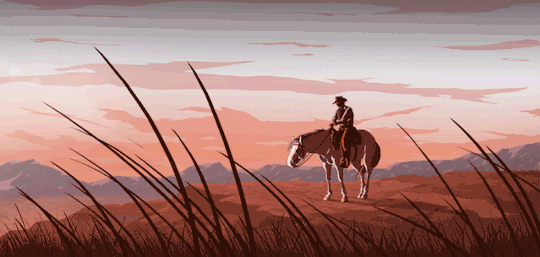
Based on this request: can you write imagines for Arthur, Sean and Charles with a non-English speaking immigrant reader? If not that’s totally okay!! (Imagining the interactions that happen between them and the reader as they try to communicate would be funny ^^)
A/N: This was very fun to write, because at some point, I too was a non-english speaking immigrant. Language barrier sucks, but when you have people like Arthur, Charles or Sean, it sucks a little less lol I’m gonna be honest, as much fun as I had wiring this, I struggled a bit, especially with Arthur. If you look at Arthur’s interaction with people who don’t speak English… It seems like he has little to no patience with them lmfao
~
It was your third week with this group of people. It might’ve been fourth or maybe even fifth, but you couldn’t tell. All the days have blended into a one, long nightmare.
You have come to this country, the new world, in search of a better life, and instead, turned out worse than where you came from.
Thankfully, a group of people have picked you up, given you food and shelter and only asked for a small contribution in the form of basic housekeeping (more like camp keeping) in return. But even that was proving to be complicated, for you didn’t speak the language that the people did. You knew a few words before coming to America, basics like “Hello”, “Thank you”, “My name is…”, but nothing more. You were planning to continue your studies once you’ve arrived, but it seems like you'll have learn on the go. You were picking up some stuff here and there from the listening to camp members talk. You would attentively listen to the leader, Dutch was his name, and try to memorize the words he spoke. Plan, faith, and money would be common words in most of his speeches, and you’ve already learned their meanings.
Arthur.
You were taking a break, sitting on the edge of the camp and sketching on a piece of paper. You enjoyed drawing. It was a relaxing hobby, and it would remind you of your childhood, back when things were simpler.
“Hey there,” you heard from behind you. You turned around, seeing Arthur.
“Hello,” you said, your accent evident even in such a simple word.
“What you doing there,” he said as he took a seat next to you, looking at the scrap of paper in your hand.
You took a second to process what he just said. You heard the word “what”, and thought that maybe he was asking what you were doing. You didn’t know how to say you were drawing in english, so you simply showed him the sketch you were working on, pointing at it with your pencil.
“Ah,” Arthur exclaimed, understanding you. “You’re drawing.”
You tilted your head, not understanding what he’s saying.
“Drawing,” he repeated. He used his hand to pretend like he’s drawing. “You,” he said pointing at you, “draw.”
“Draw,” you repeated, looking at his hands then at a scrap of paper on your own. “I am drawing.”
“There you go.”
You smiled when you understood. Even a single word was a victory for you. The sooner you knew the language, the sooner you could get back on your feet.
“I draw too sometimes,” he said.
You turned to look at him.
He shuffled a bit, reaching into his satchel and pulling out a notebook. He skimmed through a few pages before showing you one of them. There, you saw a drawing of a horse. Your own sketch, in comparison to his, looked like chicken scratches.
“You draw very good,” you said.
A small smiled tugged at Arthur’s lips and he said, “thank you”
You nodded your head with a smile on your lips mirroring his. It was nice to have conversations. Due to the language barrier between you and the rest of the camp members, it was hard to make any significant connections. Most of your conversations only went as far as “thank you” or “good morning”. Arthur, however, has been one of the only people trying to bridge the gap between you and the rest of the gang. He would often start talking to you as if the language wasn’t a problem, and if you didn’t understand something, he would try to explain with simpler terms, using his hands or pointing at things, like he did just now when explaining drawing to you.
“I know a place not far from here,” Arthur spoke up, pulling you out of your thoughts, “Lot’s of animals roam there; horses, deers. I can take you there and you can draw them. If you want to, that is.”
You took a moment to understand what he meant. You basically understood every word he said, but was having a hard time of putting them together to understand the meaning behind them.
“You and I go draw together?” you said.
Arthur chuckled a bit. It was not exactly what he meant, but it was close enough. Maybe he could use that opportunity to get to know you better, as much as the language barrier would allow.
“Sure, we can do that too.”
Charles
You were walking along the outskirts of the camp, taking a break from your chores to enjoy the nature around you. You could hear the birds sing from every tree, and as you went further into the forest, squirrels and rabbits would run around, not paying any attention to you.
When a bunny stopped almost in front of you, you smiled. You squatted down, almost eye level with the creature.
“I think he likes you,” you heard from behind you.
You turned around, seeing Charles approaching you. You smiled at him, before turning back to the bunny, who was still unfazed by your or Charle’s presence.
Charles crouched right next to you, studying the peculiar bunny like you did. He extended his hand, letting the bunny sniff it. You decided to try too, and let out a small laugh when bunny sniffed your hand as well, looking at you and then at Charles.
“He is very nice,” you said with a smile.
Charles nodded. “They can feel your intentions. He probably knows you’re not going to harm him.”
You nodded. You didn’t understand a word he said, but you still made a face as if you did. You wondered what the english word for bunny was.
“What is his name?” you said looking at Charles.
He smiled at your question. Since you’ve joined the gang, Charles admired your strength and work ethic. Even without knowing the language and barely being able to communicate with the rest of the people, you were a productive member of the camp, and have been working hard on learning the language.
He was one the first people that you talked to, and since then you would often go to him when you needed help understanding something. He was very approachable and always patient when it came to your language barrier.
“Bunny,” he replied.
“Bunny.” Your face was so serious when you tried to pronounce the word, Charles laughed a little bit.
“You got it,” he said. “Just gotta practice and it’ll sound perfect.”
“Thank you.”
Somehow, you ended up spending almost half an hour with Charles, studying all the different animals around, learning their names and a few other English words.
“Thank you very much, Charles,” you said when you finally made it back to camp.
“It’s no problem,” he said. “If you ever wanna learn anything else, you just let me know.” He winked at you before going to his tent.
You didn’t understand a word he said, but didn’t need to. That wink said all you needed to know.
Sean
It was nighttime, and most of the camp members were either getting ready for bed or gathering around the campfire, swapping stories and drinks. Due to the language barrier, you usually skipped those events; you couldn’t understand a single word they were saying and it made you feel out of place. Instead, you preferred to spend your evenings at a small table a little way from the campfire with a children’s book in your hand. You got the book from Abigail, who in turn got it from Hosea for Jack. She would lend it to you at the end of the day, after Jack has finished his lessons with Hosea, so you could learn too.
“What you doin’ here all alone?” you heard a voice say behind you.
You turned around, seeing Sean approaching you.
“Reading,” you said, showing him the book in your hand.
“Oh, that,” he said, taking a seat next to you. “I never understood the appeal of readin’. It’s ploddin’.”
“Plod-ding?” you repeated, tilting your head to the side.
“Well, you know, slow. I prefer to use my time in other ways, stealin’ or robbin’ for example.” Even though his voice sounded uplifting, you could see a hint of sadness in it. The smile that he was trying to put on didn’t quite reach his eyes.
“You don’t read?” you said.
Sean took a moment before answering your question, shifting a bit in his chair.
“No, not really,” he said. “Me pa never taught me, and after he died I didn’t really have the time.”
You nodded your head, understanding what he said.
Sean wouldn't let anyone know it, but he was really insecure about his literacy. It’s not often that he needed to read something, but when he did, he was embarrassed that he couldn’t. So instead, he decided to own it, act like he didn’t care and that it was his decision not to learn. Lenny had been trying to teach him for a while then, but it didn’t go anywhere. Everytime Sean would get stuck on a word, or his progress would stagnate, he would get irritated and give up.
“Do you want learn?” you said.
Your words pulled him out of his thoughts. “You mean, learn to read?”
“Yes,” you said. “I read everyday. This kids book. We can read together.”
Sean’s immediate thought was to decline. He’d tried and failed so many times, at this point he didn’t believe he would ever be able to learn. But, something about seeing you, a person who barely spoke a word of English, a stranger in a strange land, trying your hardest despite everything, inspired him. What’s stopping him from doing the same?
“You know what,” he said. “I think that’s a great idea. Let’s meet here tomorrow mornin’. Maybe ol’ Lenny will join us too.”
#arthur morgan x reader#charles smith x reader#sean macguire x reader#rdr2 fanfic#rdr2 x reader#arthur morgan x y/n#charles smith x y/n#sean macguire x y/n#rdr2 fanfiction#red dead redemption fanfiction#red dead redemption 2 fanfiction#red dead redemption 2 fanfic#rdr2 fanfics
334 notes
·
View notes
Text
[CN] S2 Victor- Setting Sail On A Journey (Eng Translation)
⌚ Warning: This post contains detailed spoilers for a company project that is yet to be released in the global server! ⌚

✧ NOTE ✧
This post features S2 Victor and MC, but doesn’t contain any spoiler regarding the S2 storyline!
This company project is the continuation of “Right Now Is The Time.” So remember to read that first! (◍•ᴗ•◍)
ー
[ SECTION 1 ]
MC: Goldman has broken his foot?
Didn’t he even excitedly post several mountain climbing videos in his moments two days ago, saying that he has bravely climbed to peak of the mountain? How did he suddenly break his foot?
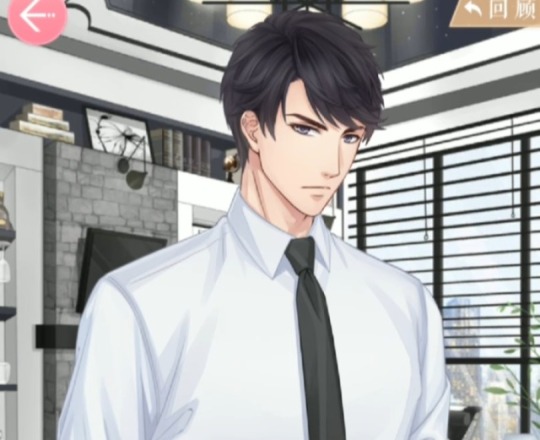
Victor: He requested for two-week leave of absence. It’s a good time to look for an intern from your show to come at the summit.
Early this morning, I received a call from Victor, saying that there is something he wants to discuss with me. So it actually turns out to be this matter....
When the fifth episode of “Right Now is The Time” is broadcast, the filming of the show will enter its final stage as well.
But in contrast to the huge attention the show is receiving now, the pre-planned filming of the show was clearly a little tame.
If an intern can be allowed to carry out Goldman’s post for filming at the summit, it will indeed be a good content to attract the mass attention.

MC: However, this position is very important. If you let the interns who are shooting in the show to come at the summit, it’d be more or less suspected as a publicity stunt....
MC: Wouldn’t it be harmful for LFG’s professionalism?
Victor is currently taking out a small box of coffee beans from the cupboard. Hearing what I’ve said, he lifts his eyes slightly to glance at me.

Victor: There is no need to think in such complicated ways.
Victor: Whether LFG is professional or not, it’s never reflected through these minor details.
Victor: I’m not worried about the issue at all, so naturally, you don’t need to be worried. What you need to think over is, as far as this design is considered, whether it’s going to be beneficial for the show or not.
Almost as soon as the words leave Victor’s mouth, I immediately step forward, and nod at him vigorously.

MC: It’s beneficial, too beneficial. It’s settled then. I’ll have him arrive on-site immediately!
MC: Oh, by the way, he is that intern who bought medicine for you before. His name is Liu Cheng.
But.... as I finish speaking in one breath, my heart is once again somewhat unable of deciding what to do. Seeing the look of wanting to say something but hesitating on my face, Victor naturally tosses in the question.

Victor: What’s wrong now?
MC: ....He’s been a little out of form lately, and I don’t know if he’d be competent for this job.
MC: His performance has always been very outstanding before.
MC: Whether it’s the proposals, making PPTs or reports, organizing documents or dealing with the suppliers– they are all more professional than the other interns.
MC: But these past two days I’ve observed him, and as long as the camera is pointed at him, his state of nervousness is visible to the unaided eye.
I actually know the reason clearly too: He shone so outstandingly that, he became the most popular intern after the show was broadcast.
Whether it’s a chance encounter with a passer-by on the street, or a breaking out on the new tidbits, he is always being pushed into the trending topics. With the huge attention sweeping over him, an imbalance in mentality is inevitable.

Victor: Any matter is a situation with two sides to it, especially the matter of being in the limelight. You know that best.
Victor: If you’re worried that he won’t be up for the task, you could substitute to someone else.
I subconsciously reject this proposal in my heart.
MC: But in terms of effects of the show, and the degree of professional compatibility, he is the most fitting....
MC: Even if it can’t be as satisfactory as people’s expectations in the end, it will still display the most real effects of the show.
Victor puts down the coffee bean grinder, and nods at me.
Victor: In a while, I’ll get someone to go and work with him.
Victor: At this present stage, he only needs to handle the simple itinerary issues. Many projects involve commercial confidentiality, and it isn’t the time for him yet to get on board. So there is nothing to be worried about.
I give Victor a beaming smile.

MC: Thank you CEO Victor for your support and attention to this show. At the celebration banquet, you’re sitting at the main table~

Victor can’t help but let out a laugh, and then sweeps his eyes on me again.
Victor: Aren’t you going to inform your intern to come over and report?
I stretch out my left hand, glance at my bare wrist, and pretend as though I’m looking at my wrist watch, lightly coughing at Victor in a deadpan tone.
MC: CEO Victor, there is still half an hour left before the LFG employees have to officially get to work....
I wink at him, my gaze falling on his coffee bean grinder.

MC: Not having a cup of coffee together?
◇──◆──◇──◆──◇──◆──
[ SECTION 2 ]
Today is the third day of Liu Cheng’s assignment in his new post, and it’s also an important day for the meeting of the new project.
Aside from Victor, several executives who have their hands in the project are all here.
At this moment, the seats in the conference room are already packed with people. But Liu Cheng, the person in charge for conducting the process, is late.
As I keep waiting at the door for a while, I catch the sight of him trotting all the way over here, and he starts bowing to me even before he reaches in front of me.
Liu Cheng: I’m sorry, I’m sorry sister MC.... I’m late.
Liu Cheng: Is CEO Victor here already? Is he angry?
I pat him on the shoulder, and let him go directly into the conference room.
Although the people sitting inside are executives, but they all have the mutual relationship of co-workers with each other. From the moment they enter through the door it’s all– you’d say one word and I’d say another one. The atmosphere is far from heavy.
But Liu Cheng is clearly intimidated, and he walks straight up to the front burying his head. I can see his face turning blue and pale, and all his limbs appear very stiff and overcautious too.
....He is obviously feeling guilty.
This eye-catching white colored suit and white sneakers of his truly form a stark contrast with the meticulous style inside LFG’s conference room.
Victor is sitting in the first seat on the left side of the conference table. He turns his head to glance towards everyone sitting at the back row, and the sound of chatter that has still been rising and falling just now, promptly dies down.
Everyone sits up straight, loosens the buttons of their suits, and places their hands on the table, preparing to listen seriously.
He turns to look at Liu Cheng again, and motions at him lightly, his face still showing no expression.
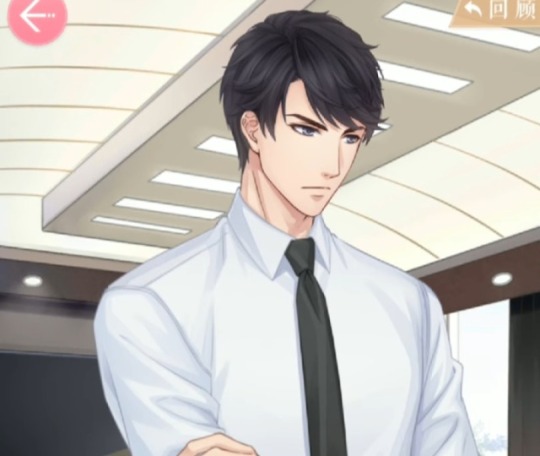
Victor: Let’s begin.
Liu Cheng hurriedly nods his head, and begins to explain the first item on the agenda to everyone according the original flow of the meeting.
After the end of the three-hour meeting, I creep up to Victor, and leave the room along with him, following into the corridor while gesturing for the cameraman to catch up.

MC: Isn’t CEO Victor going to evaluate Liu Cheng’s today’s performance?

Seeing that I’ve intentionally brought the cameraman dangling in front of him, Victor casts a helpless expression of “If you want to say something, say it directly.”
MC: The thing is, he actually had a reason for being late today, but it doesn’t really have reasonable grounds.
MC: There is an advertising company who came to our doors, and invited them to shoot a short film for an educational organization.
MC: Liu Cheng has the best appearance, and he’s also the most popular. The client designated him to take on a lot of filming materials alone.
MC: Time was too tight. He was in a hurry to leave, so he didn’t have the time to change his clothes.
While we are talking, Liu Cheng has already caught up to us on large strides, only to stand back and not daring to approach, standing a few steps away from us in a silly daze.
As Victor turns his head to glance at him, he hurriedly runs forward, bowing solemnly at Victor.
Liu Cheng: I’m sorry CEO Victor. I was late for an important meeting, and my outfit wasn’t standard either.
Liu Cheng: I don’t know if the company has a corresponding punishment system. I’m willing to accept it all.... I’ve failed to live up to CEO Victor and sister MC’s trust. I’m very sorry.
Victor remains expressionless as before, seemingly he really hasn’t taken this matter to the heart.

Victor: It’s indeed wrong to be late. Don’t do it another time.
Victor: Remember to send the summary of today’s meeting to my email before getting off work.
Hearing the first sentence “It’s indeed wrong to be late,” Liu Cheng even stifles, face turning red. But upon hearing the next sentence of being asked to do the summary of the meeting, a pleasant surprise immediately spreads across his whole face.
Liu Cheng: Y-y-yes, okay! I’ll go do it at once!
This kind of narrative direction is a very “prominent feature” in variety shows. As such, I give Victor an expression of expectation.

MC: CEO Victor.... mind if I do a very short, very brief, really very short, tiny interview of you?
Victor doesn’t refuse.
◇──◆──◇──◆──◇──◆──
[ SECTION 3 ]
I place Victor onto the sofa in the CEO’s office, and toss the questions directly without any script.
MC: Regarding the topic of Liu Cheng being late today because of an advertisement filming....
MC: CEO Victor, don’t you think it’s a very serious mistake for an intern employee to be late?
MC: Speaking from the point of view of work ethics or from the perspective of time management.
Victor gives the answer almost without thinking.
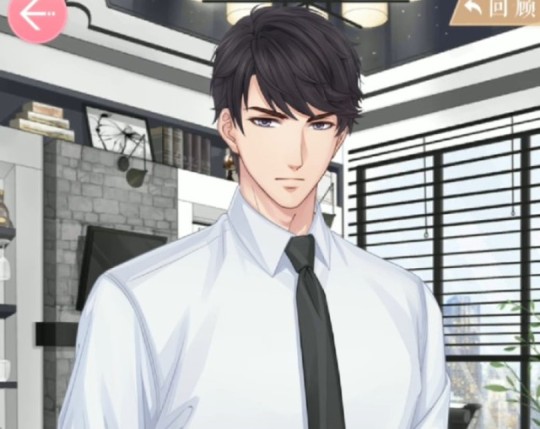
Victor: He was wrong. Then he recognized that, and I’ve also told him already that it’s not right to be late.
With that said, he points towards the camera again.

Victor: Each one of Liu Cheng’s actions, each one of his words has already been recorded on camera. His strengths will be magnified, and so will be his shortcomings in the same way.
Victor: He knows that he will be facing the criticisms of many people when the show is broadcast, and that also includes the people who now place high hopes on him, and give him unconditional support.
Victor: In my opinion, he has already undertaken all the psychological burdens he ought to be bearing in advance.
Victor: There is no need to say anything more.
When Victor says these words, I can’t help but think of the scene when I’ve discussed this topic with him before.
Carrying the title of CEO of LFG on his head, no matter what he says or what he does, everything will constantly be followed closely by the media, magnifying the views therein infinitely.
Regardless of what decision he makes, someone is bound to find mistakes in the minor details, someone is bound to wait to see him fall on his face, and make a fool of himself.
He simply never cared about these. So much so that, when I am the one feeling grievances on his behalf or taking the initiative on his behalf, he straightforwardly tells me too that I don’t need to. But—
But anyone understands the truth. He is able to put himself in Liu Cheng’s shoes, and consider the time he undertakes the heavy weight of public opinions. What if actually at a certain stage....
Even if it was for a certain moment, a certain instant, he had once also felt the similar feelings?

MC: Victor, do you think that this genre of shows for young people like Liu Cheng who are just out of school, aren’t actually meant to be very good?
Putting them in an environment where they are considered as entertainments, scrutinized, evaluated, supervised and urged on to complete a task under the publics’ gaze– perhaps it’s a consumption for them.

MC: They are still too young after all.
Victor leans forward towards me, and his purposefully slowed down voice seems to be encouraging me about something.

Victor: You’ll have to find the answer to this question for yourself.
Victor: However, according to what I’ve learnt about them in this period of time, they are among the most outstanding of youngsters— Don’t underestimate them.
He stands up and walks forward, but he still meets my gaze out of the corner of his eyes.
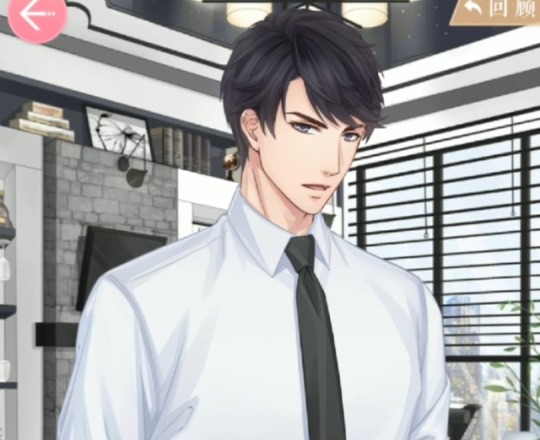
Victor: Still having coffee today?
I shift in front of him, and point to the clock on the wall.

MC: It will be the time to get off work in a while. Is CEO Victor going to work overtime to make coffee for me?

MC: How about we owe the coffee in advance, and head straight to dinner, okay?
Victor lowers his eyes to size me up, carrying an expression of whether he may be laughing or not.
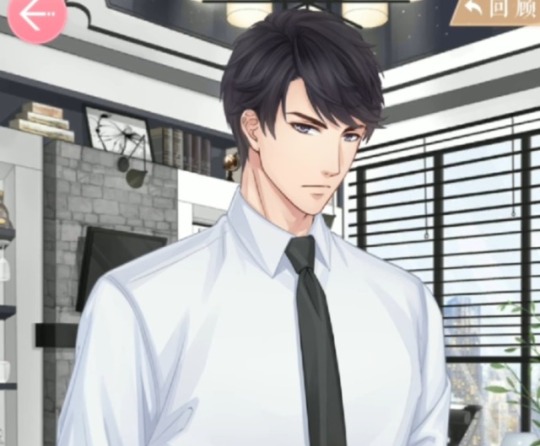
Victor: Up to you.
◇──◆──◇──◆──◇──◆──
[ SECTION 4 ]
The following two days, Victor’s schedule is about being a guest at an industry summit forum.
As it goes without saying, every time he attends an event, he is bound to gain a great amount of attention. Nowadays, he even brings the regular on trending topics, Liu Cheng, along with him. Naturally, reporters from all walks of life flock there.

Victor gets out of the car with the usual– strangers do not approach– written on his face, and is invited into the venue, sitting down at the first row of VIP seats. Liu Cheng, however, is stopped by the security guards, and is asked to enter through the audience passageway.
Seeing that Liu Cheng is alone, bunch of young reporters surrounding outside the venue immediately seize the opportunity to ask him all sorts of questions.
Reporter: W-wow! Liu Cheng, you are even more handsome in person compared to the show, and your today’s suit looks very good on you!
Reporter: Is your show still being filmed? Is the filming about to be finished? Are you planning to continue staying at LFG or go straight into the entertainment industry? You can act with that face!
Reporter: Is CEO Victor usually ominous or not? Have you ever been intimidated by him?
Liu Cheng is surrounded by them, and being unable of answering anything either, he busies in casting embarrassing smiles towards me. I hurriedly go over, pull him out of the crowd, and bring him to the venue.
Liu Cheng: ....Thank you sister MC. If I had known earlier.... and were a bit quick-witted, I could have avoided them.

MC: Once you get the hang of it, you will be experienced the next time.
Liu Cheng: Haha, I’m not a celebrity anyway. I won’t be using this kind of experience in the future....

Not long after we sit down, the host comes up on stage, and I see the lights setting off in Liu Cheng’s eyes. The individual presiding over the conference is a very famous, self-media in the finance sector.
Victor deserves to be reckoned as Victor. In the following sessions, regardless of whether it’s a core business magazine, media professionals or industrial scholars– after coming up on stage, they all can’t help but ask—
Does CEO Victor have any view on this topic?
There are several hundreds of audiences off the stage, and the entrepreneurs with the name Victor– you can’t finish counting them all on ten fingers. But when someone calls out “Mr. Victor,” the host knows that he has to give the microphone to Victor.
[ Note: Here, MC actually uses Victor’s family name in Chinese “李” (Li). What she says actually says is— “....entrepreneurs with the surname Li.... But when someone calls out ‘Mr. Li,’ the host knows that he has to give the microphone to Li Zeyan (李泽言).” The same goes for the part where MC says “Victor deserves to be reckoned as Victor” where it’s obviously hinted at the meaning of “Li Zeyan (李泽言).” In case, you are interested, here is an explanation of the meaning: ♡♡ , translated by @wedreamedlove ]
Each time as he waits for Victor to finish speaking, Liu Cheng will applaud frantically, only to clap as his both hands get red through and through. Not only him, but these hundreds of people at the infield will applaud, and the sound is akin to thunder rolls.
Halfway through the conference, Liu Cheng suddenly leans over.
Liu Cheng: Sister MC, the meeting with the advertising company is the day after tomorrow.... I’d rather not go.
He suddenly approaches with such a sentence without head or tail, which makes me react after a long time.

MC: Okay.
Liu Cheng: I’ve though about it. Also work is more important.... and now I’m working together with CEO Victor, not everyone can have this kind of opportunity.
Liu Cheng: Besides— studying business is much more interesting than filming advertisements.
Liu Cheng: I’m still more fond of business.
As he says this, Victor once again picks up the microphone to speak, and everyone all around rises to concentrate their attention, especially Liu Cheng.
I feel that the expression in his eyes as he looks at Victor, is brimmed with unprecedented resoluteness.
Perhaps it’s only me being upset over nothing, that’s all. Victor is right. They shouldn’t be underestimated.
This answer is just right.
◇──◆──◇──◆──◇──◆──
[ SECTION 5 ]
After the filming of the last episode of the show, the photography team withdraws from LFG.
As the master moves the last box of equipment in the car, I turn around and buy two cups of coffee from the coffee shop, and bring them upstairs to Victor.
MC: I’ve been freeloading your coffee for quite a while. Today it’s on me.
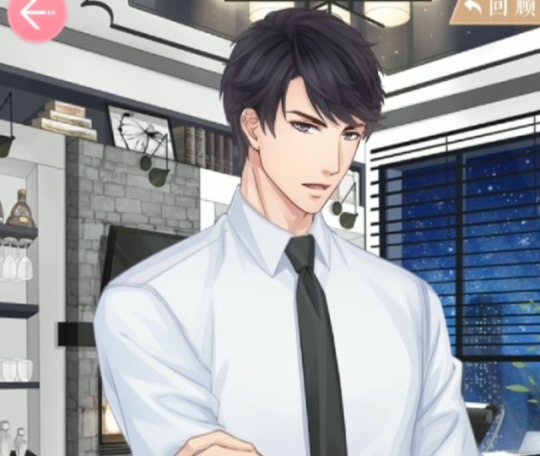
Victor: After freeloading for over ten days, giving back just one cup?
MC: ....You’re the CEO. Don’t haggle over every ounce like this.
MC: Oh, by the way, Liu Cheng filmed the last part of the interview today. Wanna know what he said?

Seeing that I’m impatiently wanting to show something, Victor picks up a stack of documents as he sips his coffee.
Victor: I can watch it when the show airs.

MC: He said....
I know he is doing it deliberately. As such, I simply bring a video of the segment in front him– which I’ve recorded, directly facing the center of his line of sight.

MC: “Receiving attention is only an outward appearance. But the reason you’re receiving the attention for is what’s more important.”
MC: “I hope that one day people will be paying attention to me because I’ve made contributions to some extent in my field, and have become a benchmark in the industry.”
MC: “When the moment comes, I will be able to let these attentions display an even bigger impact.”
MC: “And lead these attentions towards more significant fields or focus on more significant products....”
The condition of the audio recording of the video isn’t good, so I read out these words of Liu Cheng to Victor in their original form.

MC: Victor.... you are really great. You haven’t taught him any major principles, but you have made him realize these on his own with your every word and action.
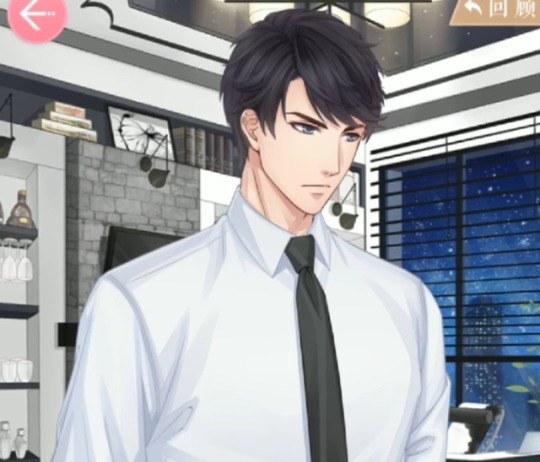
Victor: I didn’t do anything. He was the smart one.
Although Victor only says these words lightly, but his gaze has been resting on the video in my phone all along. I read-out a little bit of gratification and affirmation from this expression of his.
Victor: You’ve filmed the show pretty good this time.
With that said, he hands a folder to me. I open it and take a look at it. It’s an approval from the HR department, which contains all the jobs these interns are about to be assigned to.
Each one of them has received a formal offer, and they are on the verge of taking a step forward, exhibiting their talents within this tremendous business empire of LFG.
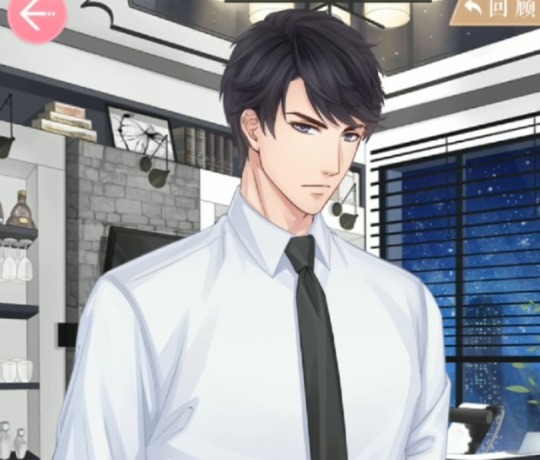
Victor: Liu Cheng is the only school student enrollment of the Investment Banking Department this year.
Victor: Everyone speaks very highly of him. You have a pretty good eye in choosing people too.

MC: Of course— This is the best that I’ve tracked down and selected very carefully from thousands of excellent students. It was easy on you!
I put down the folder, and slowly lean closer to Victor.

MC: CEO Victor, I’ve recommended eight people to you at one-time, and all of them are on board. Shouldn’t we settle this “headhunting fee?”
Victor ponders for a while, and then nods to my surprise. He turns on his phone, and I don’t know what he fiddles with– I instantly receive a new email.
— A notification of project approval being granted?

Victor: Your approval has been granted. You can start to prepare for the new project.

MC: ....

Victor: Not worth being happy about?
I don’t know whether to laugh or cry, and being left with no better option– I nod at him heavily.
MC: Worth it.... very much worth it. Thanks CEO Victor for your affirmation. As always, I will be troubling you with the next show as well!
Victor laughs as he turns off the computer, and then he gets up to pick up his suit jacket.

Victor: Let’s go, luminous and sparkling gold medal producer.
Victor: It’s time for dinner.
Having returned to my senses, I find that the curtain of night has long since fallen, the french window reflecting the silhouettes of Victor and I.
And outside the window, the white lights of countless office buildings intersect as they echo each other, embellishing the night sky, and gazing into the distant vast sky full of stars accompanying each other.

MC: Mm, let’s go.
◇──◆──◇──
[ EXTRA TIDBITS- Spoiler Warning: ]
On the “coffee” being a running topic in this company project—
Even though it’s a normal happening for the characters in the game to have coffee together, but in Victor’s case— it holds a special meaning. In CH 37 of S1, in the farewell with Victor, MC told him that she will bring him a cup of coffee when she returns.
In S2, CH 1: We have Victor saying it himself that MC always brings him coffee. And we also see how seriously MC takes this gesture (despite the Victor she brings the coffee to, not remembering it now) when she makes a detour only to buy him a cup of coffee.
In the R&S “Seaming the words and thoughts:” [ translated by @ey8508 ] We see that this has turned into a very terrible habit.
In CH 10: We see that this habit is still very much thriving.
....Just me casually dropping some angst. :'(
ー
#THEM and the way they reciprocate each other... ಡ‸ಡ#...and THIS MAN ಡ‸ಡ#mlqc cn#mlqc victor#mlqc li zeyan#mlqc spoilers#mldd victor#mr love victor#mlqc#mr love queen's choice#li zeyan#mlqc s2#mlqc season 2#love and producer#李泽言#恋与制作人#mlqc translations
32 notes
·
View notes
Text
lion primary (bird model) + slightly burnt lion secondary
Hi there! I’m a fan of your sorting posts, and of your kind and insightful way of supporting people in finding out more about themselves. So naturally I’d be very interested in your take about my own sorting, if you’re game! :)
I won’t talk much about my Secondary, because now that I’m starting to unburn my Lion seems very clear to me, even when my explosion-prone Badger model still tries to get in the way of that clarity sometimes. The more interesting riddle is my Primary. So far I’m operating under the working theory that I am a Lion with a very strong Bird model - or is it the other way ‘round?
The supposed dichotomy between “thinking” and “feeling” in many of the more binary personality models has always bugged me, so it’s no wonder this is the area where whenever I feel like I’ve decided on who I am (for now) a new question mark pops up (so much fun!).
If ‘thinking’ and ‘feeling’ doesn’t work for you as terminology, it might help to think of Lion as leading with subconscious reasoning, and Bird as leading with conscious reasoning.
Instead of trying to formulate a cohesive text, which would have gotten even longer, I’m putting together an associative list of thoughts and stories that kept turning up while I was trying to figure out my Primary.
A very Lion primary way to solve a problem, not gonna lie ;)
- I think I got my Bird model from my father, who made quite an effort to teach me to look at things from all angles. As a child, whenever I got in a fight with this friend I had, he would sit me down and ask me to put myself in my friend’s shoes. It was hard, because a lot of the time my friend was being unfair to me and I actually could have used some support, someone to tell me that it was not okay to treat me this way. But I’m still immeasurably grateful for my father’s lessons, through which I’ve learned to understand peoples’ motivations and gained an understanding for the complexities of every conflict. He also taught me to doubt, to look closer, to not just believe the first thing I see, or want to see. To this day I still consider my ability to pin down the relevant factors of a situation before I make judgments one of my strengths.
That definitely sounds like a very strong, beloved Bird model.
- Whenever I had to write an essay at school or uni, I first had to come up with some aspect about the subject that I really cared about, even could be passionate about. (I am passionate about many things, so it was usually possible to find some connection to that.) Then I would use the essay to discuss this aspect in great detail, ending with a polemic flourish. I had the time of my life doing that; meanwhile the text would structure itself magically in relation to the issue I had chosen to focus on. Whenever I tried to write without such a focus, I’d get bored, stressed and the text would be of a much lower quality.
- Something similar happened in oral exams at uni: Only when I got the opportunity to bring a discussion paper (a few pointed statements regarding the exam topic) which I could then debate, I was able to recollect all the important details I needed for that. If I just had to report on the topic or answer questions, I often got confused, to the point of drawing a complete blank.
Linking things to emotion and passion - thinking with emotion and passion, basically - is a Lion primary thing. Especially if doing that makes you feel safe & comfortable & effective & happy.
- Even as a teenager I was very interested in philosophy, ethics and moral decision making.
I love teaching philosophy to teenagers. It’s the perfect time for it, they are so into it, and if it were up to me I would absolutely make it a required class.
I picked up certain philosophical ideas and concepts that I liked and integrated them in my belief system (yes, I know how very Bird that sounds).
I had my mind blown by Genealogy of Morals in high school, and I still won’t shut about Eichmann in Jerusalem. But what was so staggering to me in high school was… here are these ways of thinking that are possible and allowed. The fact that here they are in words in front of me made me a great deal more expansive.
Now that I think about it — I don’t remember adjusting my beliefs as in any way traumatic back then. The shift from a belief in the Christian God to Mother Goddess to my very own brand of agnostic paganism was smooth, natural.
Now that I think about it… I would describe myself as a mythic relativist (which is a term I just made up.) Systems of belief are metaphors, and they’re metaphors trying to describe and say something large and beautiful about what it means to be human, and what it means to live a good life. And since we are all human, they are all attempting to describe the same central, indescribable thing in different ways.
I feel this very deeply, but it took me a long while to be able to articulate it.
I constantly reevaluate, and I adapt.
You stop reevaluating and adapting, might as well be dead.
Still, there are some basics I’ve kept with me that just make too much sense to me to give up, and some that perhaps I keep because I just really like them and I’m kind of attached to them.
… somebody’s thinking with Pathos :)
- I’m a constructivist at heart, so that makes it much easier to tweak the content of my beliefs while staying true to the principle that we (socially) construct our reality, and (my take on this): that I choose what kind of world I want to live in, and according to that I make choices which are the most likely to create that world.
- At uni I attended a seminar about the development of moral judgment and action. What I remember most clearly about it is how much it bugged me that the other students didn’t seem to understand that morality always depends on the perspective. Even though I had definite moral convictions that I was ready to fight for, at the same time it seemed obvious to me that theoretically there could be a justification for every kind of moral guideline; it depended on your principles and the world you wanted to live in.
A human after my own heart.
I wanted to understand these different perspectives, not talk about empty categories like “right and wrong” or “good and evil” that meant nothing to me. I still feel that way.
Absolutely. I don’t use alignments when I DM Dungeons & Dragons. I mean, I can list evil *things* but that’s not the same thing as defining *being evil.* I want to know WHY these people did these evil things.
It just seems so impractical and complicated to base a conversation on those broad categories that don’t have any definition people can agree on instead of referring either to defined principles (in order to explain what good/ bad is *for you*) or consequences of certain actions, and whether you want them/ accept them/ don’t want them.
Oh that’s a fun discussion. Asking a highschooler to define “evil.”
(and then they have to figure out what moral systems Jigsaw, Pinhead, the Joker, and Bane all subscribe to.)
- Between “the Revolutionary” and “the Grail Knight”, I would love to be the former, but I’m clearly the latter. I’m someone who questions, not someone who knows.
Take my archetypes with a grain of salt, they are supposed to describe characters. (Who are different from people - but still useful, because they are attempts to describe us.) I actually want to write more about the differences I see between the way fictional secondaries are written and the way real-life secondaries work.
And just “knowing”... is dangerous. That’s how Exploded Lions happen.
There are a lot of causes I find worthy to fight for, but I haven’t committed to any one, which so far I’ve attributed to my Burned Secondary (How do I do things?).
Sounds about right.
If I’m honest, though, it feels a bit strange to really, really fight for anything. I’d rather contribute to the cause by keeping an eye on whether we stay aligned to our values on every level of the fight, not by storming sightlessly in front of some army. (I got polemic again, didn’t I? ;))
So after all this Bird talk, why do I think that I’m a Lion?
… that was the Bird segment?
- I trust my intuition. It has never steered me wrong, with one exception: My Primary burned for a time when I first understood the concept of privilege and internalized bias, which was coincidentally at a time when I also went through a lot of changes in my personal life. Like many people unaware of their own privilege, I had thought of myself as “one of the good ones”. I learned that even with the best intentions I could cause great harm without even noticing it. This then also happened to me in a relationship, when I was already confused, hurt and more than a bit burned. It seemed like I couldn’t trust my intuition anymore, but I also couldn’t figure out intellectually what to believe, because I felt mentally overwhelmed by all those new concepts, all of which put my previous convictions into question. Which Primary burned then?
Been there, done that, it’s brutal. It sounds to me like a Lion dramatically changing direction - that’s what I mean when I say that it *hurts* when a Lion changes their mind. Birds see their past selves that thought wrong as almost different people. “I wasn’t aware of my privilege then, now I am, and can take steps doing forward.” But if you’re a lion it’s like… I *should* have been aware, and the fact that I wasn’t says something terrible about my moral/emotional calibration, and THAT has to be put right.
- I felt like everything I had learned about the world and myself didn’t count anymore. My concepts and my strategies didn’t serve me anymore. So I started to rebuild everything from scratch, this time with less pride and more practicality.
Yeah. That’s some Lion recalibration. With a Bird Model, to help.
- Anyway, I trust my intuition. It contains my experiences, instinct and all my accumulated unconscious observations of the situation, and it’s very reliable. Usually I use it as an important source of information which I try to back up with data/ understanding, but when push came to shove and the apparent facts would contradict what my intuition told me, I would be unable to set my gut feeling aside. I wouldn’t follow it blindly, of course. But I would never just go against it either. If the voices of my unconscious and conscious mind don’t align, I keep poking at the issue until they do. If I absolutely cannot come to a satisfying conclusion, I go with my gut. Since I know it usually knows what it’s doing, I’ll find out the reasons for my feelings later. (Weird, says my inner bird who is busy compiling these examples.)
I’LL FIND THE REASON FOR MY FEELINGS LATER. What a perfect way of articulating what is perhaps the central experience of being a Lion primary.
- Probably I’m just both, you know. Some interesting lion/bird-chimaera. I like it.
I read you as a pretty clear Lion Primary, Bird primary model. But as always, the decision is very personal.
- I have a weird way of processing information: I read/ hear it, work to understand it, work to connect it to existing knowledge in my mind, then my beliefs, my existing knowledge and my feelings about it all wind around each other, grow into each other, some dissolve together, becoming a swamp which then nourishes the plants of new ideas and connections that grow from it.
You grok it. And that’s not weird.
I often can’t remember where certain knowledge came from. I can’t take it out of a memory shelf and tell you about it. I usually remember that I’ve read a certain book and whether I liked it / it influenced me, but I won’t exactly remember what was in it, even if it was important to me. Because all that information is already processed/ digested/ transformed into something new. It’s much easier to access my memory swamp intuitively than consciously.
and you seriously had like… any doubt that you were a Lion.
In intellectual discussions I tend to get stuck because I just can’t remember enough of the details (for my satisfaction), just my conclusions about the topic and how I feel about it.
I’m inclined to think that not accessing the details is either a secondary thing, or an entirely unrelated processing thing.
What do you make of all this? I’m very curious!
:)
[On an unrelated note, I’d like to specify the compliment I made at the beginning of this post. I’m really impressed with your ability to pick up on what people need, not just what they say they want. As a counselor this is a skill I try to hone, so I know how difficult it is to not get too distracted by the story people tell and miss the more subtle cues. You have a powerful combination of perceptiveness, insight and so much kindness, which you use to effectively support people who have questions, are in distress or confused. You don’t generalize. You don’t judge. You see the people who talk to you. I love that you’re a teacher, because I can see you’re using the influence that gives you in a way that contributes to making the world a better place. Fellow Idealist, I’d like to give you a High Five for that, if I may. :)))]
I’m not sure I’ve ever been given a better compliment. Thank you.
23 notes
·
View notes